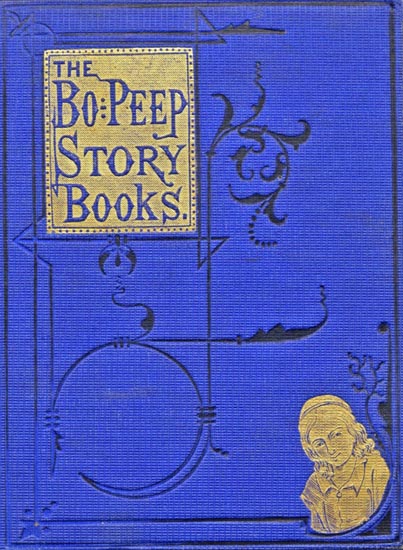
The Project Gutenberg EBook of Bo-Peep Story Books, by Anonymous This eBook is for the use of anyone anywhere at no cost and with almost no restrictions whatsoever. You may copy it, give it away or re-use it under the terms of the Project Gutenberg License included with this eBook or online at www.gutenberg.org Title: Bo-Peep Story Books Author: Anonymous Editor: Clara de Chatelain Release Date: May 13, 2008 [EBook #25461] Language: English Character set encoding: ISO-8859-1 *** START OF THIS PROJECT GUTENBERG EBOOK BO-PEEP STORY BOOKS *** Produced by Marilynda Fraser-Cunliffe and the Online Distributed Proofreading Team at https://www.pgdp.net (This file was made using scans of public domain works in the International Children's Digital Library.)

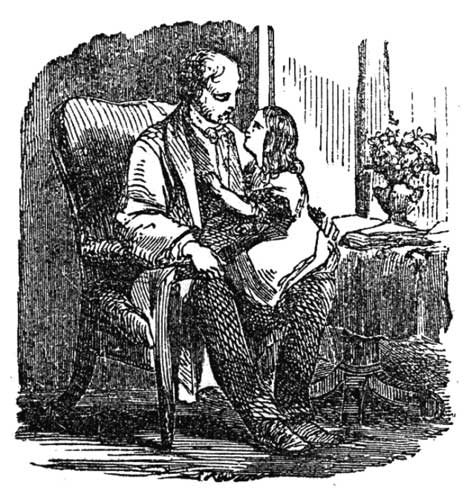
NEW YORK:
LEAVITT & ALLEN BROS.,
No. 8 HOWARD STREET.
There once lived a gentleman, who, on becoming a widower, married a most haughty woman for his second wife. The lady had two daughters by a former marriage, equally proud and disagreeable as herself, while the husband had one daughter, of the sweetest temper and most angelic disposition, who was the complete counterpart of her late mother. No sooner was the wedding over, than the stepmother began to show her bad temper. She could not bear her stepdaughter's good qualities, that only showed up her daughters' unamiable ones still more obviously, and she accordingly compelled the poor girl to do all the drudgery of the household. It was she who washed the dishes, and scrubbed down the stairs, and polished the floors in my lady's chamber, and in those of the two pert misses, her daughters; and while the latter slept on good featherbeds in elegant rooms, furnished with full-length [Pg 4]looking-glasses, their sister lay in a wretched garret on an old straw mattress. Yet the poor thing bore this ill treatment very meekly, and did not dare complain to her father, who was so besotted to his wife that he would only have scolded her.
When her work was done, she used to sit in the chimney corner amongst the cinders, which had caused the nickname of Cinderella to be given her by the family; yet, for all her shabby clothes, Cinderella was a hundred times prettier than her sisters, let them be drest ever so magnificently.
It happened that the king's son gave a ball, to which he invited all the nobility; and, as our two young ladies made a great figure in the world, they were included in the list of invitations. So they began to be very busy choosing what head-dress and which gown would be the most becoming. Here was fresh work for poor Cinderella; for it was she, forsooth, who was to starch and get up their ruffles, and iron all their fine linen; and nothing but dress was talked about for days together. “I,” said the eldest, “shall put on my red velvet dress, with my point-lace trimmings.” “And I,” said the younger sister, “shall wear my usual [Pg 5]petticoat, but shall set it off with my gold brocaded train and my circlet of diamonds.” They sent for a clever tire-woman to prepare the double rows of quilling for their caps, and they purchased a quantity of fashionably cut patches. They called in Cinderella to take her advice, as she had such good taste, and Cinderella not only advised them well, but offered to dress their hair, which they were pleased to accept. While she was thus busied, the sisters said to her, “And pray, [Pg 6]Cinderella, would you like to go to the ball!” “Nay, you are mocking me,” replied the poor girl; “it is not for such as I to go to balls.” “True enough,” rejoined they; “folks would laugh to see a Cinderella at a court ball.”
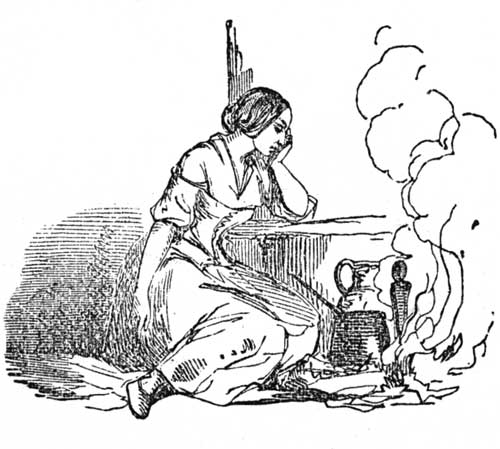
Any other but Cinderella would have drest their hair awry to punish them for their impertinence, but she was so good natured that she dressed them most becomingly. The two sisters were so delighted, that they scarcely ate a morsel for a couple of days. They spent their whole time before a looking-glass, and they would be laced so tight, to make their waists as slender as possible, that more than a dozen stay-laces were broken in the attempt.

The long-wished-for evening came at last, and off they set. Cinderella's eyes followed them as long as she could, and then she was fain to weep. Her godmother now appeared, and seeing her in tears inquired what was the matter. “I wish—-I wish,” began the poor girl, but tears choked her utterance. “You wish that you could go to the ball,” interrupted her godmother, who was a fairy. “Indeed I do!” said Cinderella, with a sigh. “Well, then, if you will be a[Pg 7] good girl, you shall go,” said her godmother. “Now fetch me a pumpkin from the garden,” added she. Cinderella flew to gather the finest pumpkin she could find, though she could not understand how it was to help her to go to the ball. But, her godmother having scooped it quite hollow, touched it with her wand, when it was immediately changed into a gilt coach. She then went to the mousetrap, where she found six live mice, and bidding Cinderella let them out one by one, she changed each mouse into a fine dapple-grey[Pg 8] horse by a stroke of her wand. She next considered what she should do for a coachman, when Cinderella proposed to look for a rat in the rat-trap. “That's a good thought,” quoth her godmother, “so go and see.” Sure enough, Cinderella returned with the rat-trap, in which were three large rats. The fairy chose one who had a tremendous pair of whiskers, and forthwith changed him into a coachman with the finest moustachios ever seen. She then said: “Now go into the garden, and bring me six lizards, which you will find behind the watering-pot.” These were no sooner brought, than they were turned into six footmen, with laced liveries, who got up behind the coach just as naturally as if they had done nothing else all their lives. The fairy then said to Cinderella: “Now here are all the means for going to the ball; are you not pleased?” “But must I go in these dirty clothes?” said Cinderella, timidly. Her godmother merely touched her with her wand, and her shabby clothes were changed to a dress of gold and silver tissue, all ornamented with precious stones. She next gave her the prettiest pair of glass slippers ever seen. She now got into the carriage, after having been warned by her[Pg 9] godmother upon no account to prolong her stay beyond midnight, as, should she remain a moment longer at the ball, her coach would again become a pumpkin, her horses mice, her footmen lizards, while her clothes would return to their former shabby condition. Cinderella promised she would not fail to leave the ball before midnight, and set off in an ecstacy of delight. The king's son, on being informed that some great princess, unknown at court, had just arrived, went to hand her out of her carriage, and brought her into the hall where the company was as[Pg 10]sembled. The moment she appeared, all conversation was hushed, the violins ceased playing, and the dancing stopped short, so great was the sensation produced by the stranger's beauty. A confused murmur of admiration fluttered through the crowd, and each was fain to exclaim “How surpassingly lovely she is!” Even the king, old as he was, could not forbear admiring her like the rest, and whispered to the queen, that she was certainly the fairest and comeliest woman he had seen for many a long day. The ladies were all busy examining her head-dress and her clothes, in order to get similar ones the very next day, if, indeed, they could meet with stuffs of such rich patterns, and find workwomen clever enough to make them up.

After leading her to the place to which her rank seemed to entitle her, the king's son requested her hand for the next dance, when she displayed so much grace as to increase the admiration her beauty had raised in the first instance. An elegant supper was next brought in, but the young prince was so taken up with gazing at the fair stranger, that he did not partake of a morsel. Cinderella went and sat by her sisters, sharing with them the oranges and citrons[Pg 11] the prince had offered her, much to their surprise, as they did not recognise her in the least.
When Cinderella heard the clock strike three-quarters past eleven, she made a low curtsey to the whole assembly, and retired in haste. On reaching home, she found her godmother, and after thanking her for the treat she had enjoyed, she ventured to express a wish to return to the ball on the following evening, as the prince had requested her to do. She was still relating to her godmother all that had happened at court, when her two sisters knocked at the door. Cinderella went and let them in, pretending to yawn and stretch herself, and rub her eyes, and saying: “How late you are!” just as if she was woke up out of a nap, though, truth to say, she had never felt less disposed to sleep in her life. “If you had been to the ball,” said one of the sisters, “you would not have thought it late. There came the most beautiful princess ever seen, who loaded us with polite attentions, and gave us oranges and citrons.”
Cinderella could scarcely contain her delight, and inquired the name of the princess. But they replied that nobody knew her name, and that the king's son[Pg 12] was in great trouble about her, and would give the world to know who she could be. “Is she, then, so very beautiful?” said Cinderella, smiling. “Lord! how I should like to see her! Oh, do, my Lady Javotte, lend me the yellow dress you wear every day, that I may go to the ball and have a peep at this wonderful princess.” “A likely story, indeed!” cried Javotte, tossing her head disdainfully, “that I should lend my clothes to a dirty Cinderella like you!” Cinderella expected to be refused, and was not sorry for it, as she would have been puzzled what to do, had her sister really lent her the dress she begged to have.
On the following evening, the sisters again went to the court ball, and so did Cinderella, drest even more magnificently than before. The king's son never left her side, and kept paying her the most flattering attentions. The young lady was nothing loth to listen to him; so it came to pass that she forgot her godmother's injunctions, and, indeed, lost her reckoning so completely, that, before she deemed it could be eleven o'clock, she was startled at hearing the first stroke of midnight. She rose hastily, and flew away like a startled fawn. The prince attempted to follow[Pg 13] her, but she was too swift for him; only, as she flew she dropped one of her glass slippers, which he picked up very eagerly. Cinderella reached home quite out of breath, without either coach or footmen, and with only her shabby clothes on her back; nothing, in short, remained of her recent magnificence, save a little glass slipper, the fellow to the one she had lost. The sentinels at the palace gate were closely questioned as to whether they had not seen a princess coming out; but they answered they had seen no one except a shabbily drest girl, who appeared to be a peasant rather than a young lady.
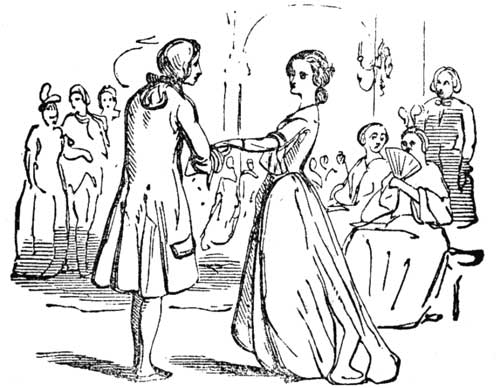
When the two sisters returned from the ball, Cinderella asked them whether they had been well entertained; and whether the beautiful lady was there? They replied, that she was; but that she had run away as soon as midnight had struck, and so quickly as to drop one of her dainty glass slippers, which the king's son had picked up, and was looking at most fondly during the remainder of the ball; indeed, it seemed beyond a doubt that he was deeply enamoured of the beautiful creature to whom it belonged.
They spoke truly enough; for, a few days afterwards, the king's son caused a proclamation to be made, by sound of trumpet, all over the kingdom, to the effect that he would marry her whose foot should be found to fit the slipper exactly. So the slipper was first tried on by all the princesses; then by all the duchesses; and next by all the persons belonging to the court: but in vain. It was then carried to the two sisters, who tried with all their might to force their feet into its delicate proportions, but with no better success. Cinderella, who was present, and recognised her slipper, now laughed, and said: “Suppose I were to try?” Her sisters ridiculed such[Pg 15] an idea; but the gentleman who was appointed to try the slipper, having looked attentively at Cinderella, and perceived how beautiful she was, said that it was but fair she should do so, as he had orders to try it on every young maiden in the kingdom. Accordingly, having requested Cinderella to sit down, she no sooner put her little foot to the slipper, than she drew it on, and it fitted like wax. The sisters were quite amazed; but their astonishment increased ten fold, when Cinderella drew the fellow slipper out of[Pg 16] her pocket, and put it on. Her godmother then made her appearance; and, having touched Cinderella's clothes with her wand, made them still more magnificent than those she had previously worn.
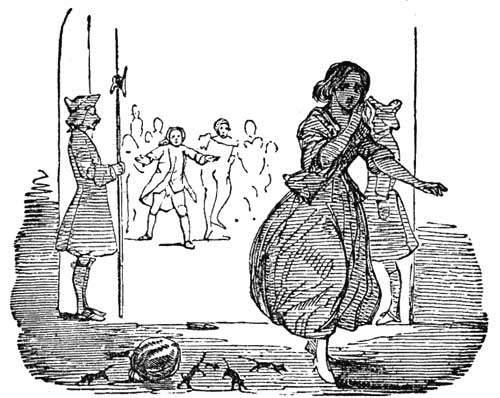
Her two sisters now recognised her for the beautiful stranger they had seen at the ball; and, falling at her feet, implored her forgiveness for their unworthy treatment, and all the insults they had heaped upon her head. Cinderella raised them, saying, as she embraced them, that she not only forgave them with all her heart, but wished for their affection. She was then taken to the palace of the young prince, in whose eyes she appeared yet more lovely than before, and who married her shortly after.
Cinderella, who was as good as she was beautiful, allowed her sisters to lodge in the palace, and gave them in marriage, that same day, to two lords belonging to the court.[Pg 17]


There was once a wealthy merchant who had three sons and three daughters. The latter were extremely pretty, especially the youngest, who, indeed, was called in childhood the little Beauty,—a nickname that clung to her ever after, much to the jealous annoyance of her sisters. Nor did she excel them more in beauty than in goodness. The two eldest sisters were so proud of their father's fortune that they would not condescend to herd with other merchants' daughters, but were always dangling after persons of quality, and frequenting balls and plays, and laughed at their youngest sister for spending her time in reading instructive books. As they were known to be rich, many wealthy merchants offered to marry them; but the two eldest replied, that they could not think of anybody below a Duke, or at least an Earl, while Beauty answered, that she thanked them for their good opinion, but that, being still very young, she wished to remain a few years longer with her father.

It happened that the merchant was suddenly ruined, and nothing was left of all his vast property but a[Pg 19] small house in the country, whither, he informed his children, they must now remove. The two eldest replied, that for their parts they need not leave town, as they had plenty of lovers who would be too happy to marry them even without a fortune. But here they were strangely mistaken. Their lovers would not even look upon them now; and, as they had made themselves odious by their pride, nobody pitied them for their fall, though every one felt sorry for Beauty. Indeed, several gentlemen offered to marry her, portionless as she was; but she told them she could not resolve to abandon her father in his misfortunes. The[Pg 20] family now removed into the country, where the father and his sons tilled the ground, while Beauty rose daily at four o'clock, and did all the work in the house. At first this drudgery seemed very hard, but after a time she grew stronger, and her health improved. When her work was over she read, played on the harpsichord, or sang as she sat at her spinning-wheel. As to her two sisters, they were perfectly helpless, and a burden to themselves. They would rise at ten, and spend the live-long day fretting for the loss of their fine clothes and gay parties, and sneer at their sister for her low-born tastes, because she put up with their unfortunate position so cheerfully.
The family had spent about a year in their retreat, when the merchant received a letter, informing him that a ship freighted with goods belonging to him, that was thought to be lost, had just come into port. At this unexpected news the two eldest sisters were half wild for joy, as they now hoped they would soon leave the cottage; and when their father was about to go and settle his business, they begged him to bring them back all sorts of dresses and trinkets. When the father perceived that Beauty did not ask for anything, he inquired what he should bring her.[Pg 21] “Why, since you ask me, dear father,” said she, “I should like you to bring me a rose, as none grow in these parts.” Now, it was not that Beauty particularly cared about his bringing a rose, only she would not appear to blame her sisters, or to seem superior to them, by saying she did not wish for anything. The good man set off, but when he reached the port, he was obliged to go to law about the cargo, and it ended in his returning as poor as he came. He was within thirty miles of home, when, on passing by night through a large forest, he was overtaken by a heavy fall of snow, and, having completely lost his way, he began to be afraid he should die of hunger and cold, when of a sudden he perceived a light at the end of a long long avenue of trees, and, on making for that direction, he reached a splendid palace, where, to his surprise, not a human being was stirring in any of the court-yards. His horse followed him, and, seeing a stable-door open, walked in, and here the poor jaded beast fed heartily on the hay and oats that filled the crib. The merchant then entered the house, where he still saw nobody, but found a good fire, and a table ready laid for one person, with the choicest viands. Being completely drenched, he drew near the fire to dry his clothes, saying to him[Pg 22]self, “I hope the master of the house or his servants will excuse the liberty I am taking, for no doubt it will not be long before they make their appearance.” He then waited a considerable while, still no one came, and by the time the clock struck eleven, he was so exhausted with hunger that he took up a chicken, which he devoured in two mouthfuls, and in a perfect tremor. He next drank several glasses of wine, when, taking courage, he left the hall, and crossed several suites of rooms most magnificently furnished. At last he found a very nice chamber, and, as it was now past midnight, and he was excessively tired, he closed the door and went to bed.
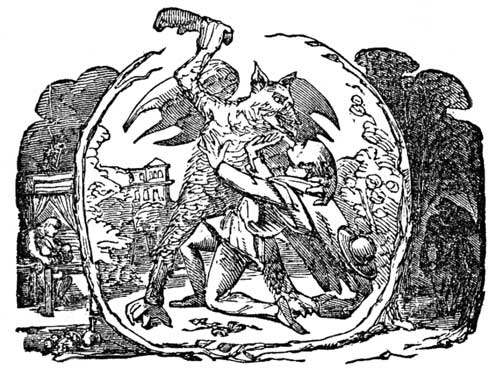
The merchant did not wake till ten o'clock on the following morning, when he was surprised to find a new suit of clothes instead of his own, which were spoiled. He now concluded the palace belonged to some beneficent fairy; a notion which was completely confirmed on his looking out of window, and seeing that the snow had given place to flowery arbours and the most enchanting gardens. Having returned to the great hall, where he had supped on the previous night, he saw a small table, on which stood some chocolate ready for his breakfast. When his meal was[Pg 23] finished, he went to look after his horse, and, as he happened to pass under a bower of roses, he bethought him of Beauty's request, and plucked a bunch to take home. No sooner had he done so than he heard a frightful roar, and saw such a horrible beast stalking up to him that he was ready to faint with alarm. “You are most ungrateful,” cried the Beast, in a terrific voice. “I saved your life by admitting you into my palace, and you reward me by stealing my roses, which I love beyond everything else! You shall pay the forfeit with your life's blood.” The poor merchant threw himself on his knees before the Beast, saying: “Forgive[Pg 24] me, my Lord, I did not know I should offend you by plucking a rose for one of my daughters, in compliance with her wishes.” “I am not a lord, but a beast,” answered the monster; “I hate flattery, and you will not come over me with any fine speeches; but, as you say you have daughters, I will forgive you, provided one of them comes willingly to die in your stead, but swear that, should they refuse, you will return in three months.” The merchant had not the most distant intention of sacrificing one of his daughters, but wishing to see his children once more before he died, he swore to return, and the Beast dismissed him, telling him he need not go empty-handed, but that, if he returned to his bed-chamber, he would find a large trunk, which he was at liberty to fill with anything he fancied in the palace, and that it would be sent after him. Somewhat comforted at the idea of leaving his children provided for, the merchant returned to his room, where he found a quantity of gold pieces; and having filled the trunk, he left the palace in a far sadder mood than he had entered it. On reaching home, he gave the roses to his daughter, saying: “Take them, Beauty: you little think how dear they have cost your poor father.” And thereupon, he related all that had befallen[Pg 25] him. The two eldest sisters then began to rend the air with their lamentations, and to upbraid Beauty for being the cause of their father's death, because, forsooth, she didn't ask for dresses, as they did, in order to seem wiser than they; and now she had not even a tear for the mischief she had done. But Beauty replied, it were of little use to weep, for that she was quite resolved to go, and die in her father's stead. “No,” cried the three brothers, “we will go and seek this monster, and either he or we shall perish.” But the merchant assured them it was vain to attempt resisting the Beast's all-powerful will, and that it was their duty to live to protect their sisters, as it was his to sacrifice the few remaining years he could expect to enjoy. Meanwhile, the merchant, having forgotten all about the trunk, was much surprised to find it on retiring to his chamber; but he said nothing about it for the present to his eldest daughters, as he knew they would pester him to return to town.
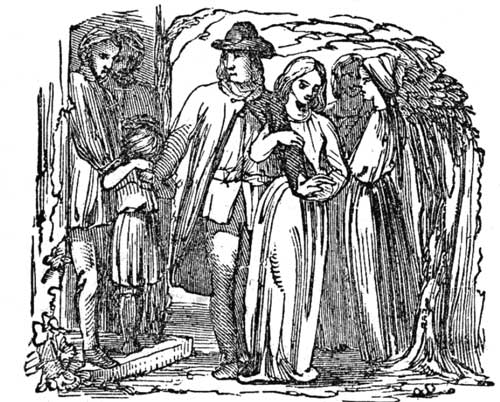
When the day came that Beauty was to set out with her father, the two heartless sisters rubbed their eyes with an onion to appear as if they had cried a great deal, while her brothers shed real tears, as well as the father himself. The horse took the right road[Pg 26] of his own accord, and, on reaching the palace, which was illuminated as before, he went at once into the stable, while the father and daughter entered the great hall, where two covers were laid on a table loaded with the most dainty fare. After supper they heard a tremendous noise. Beauty shuddered on seeing the Beast enter, and when he inquired whether she had come willingly, she could not help trembling as she faltered out “Yes.” “Then I am obliged for your kindness,” growled the Beast; and, turning to the father, he added: “As for you—get you gone to-morrow, and never let me see you here again. Good[Pg 27] night, Beauty.” “Good night, Beast,” answered she, and then the monster retired. The merchant again fell to entreating his daughter to leave him, but the next morning she prevailed on him to set out; which he, perhaps, would not have done, had he not felt a faint hope that the Beast might, after all, relent. When he was gone, Beauty could not help shedding some tears; after which she proceeded to examine the various rooms of the palace, when she was surprised to find written upon one of the doors, “Beauty's Apartment.” She opened it in haste, and found a magnificently furnished room, and was much struck on seeing an extensive library, a harpsichord, and music books; for she concluded that, if she had only a day to live, such amusements would not have been provided for her. Her surprise increased, on opening one of the books, and seeing written in golden letters, “Your wishes and commands shall be obeyed: you are here the queen over everything.” “Alas!” thought she, “my wish would be to see what my poor father is now about.” No sooner had she expressed this desire in her own mind, than she saw depicted in a large looking-glass her father's arrival at home. Her sisters came out to meet him, and, in spite of their[Pg 28] affected sorrow, it was plain enough that they rejoiced in their hearts at his returning alone. This vision disappeared a moment afterwards, and Beauty felt grateful to the Beast for complying with her wishes. At noon she found dinner ready for her; and she was treated all the while to an excellent concert, though she saw nobody. At night the Beast came, and asked leave to sup with her, which of course she could not refuse, though she trembled from head to foot. Presently he inquired whether she did not think him very ugly. “Yes,” said Beauty, “for I cannot tell a lie; but I think you very good.” The supper passed off pleasantly enough, and Beauty had half recovered from her alarm, when he suddenly asked her whether she would marry him. Though afraid of irritating him, she faltered out: “No, Beast,” when he sighed so as to shake the whole house, and saying: “Good night, Beauty,” in a sorrowful tone, left the room, much to her relief, though she could not help pitying him from her soul.
Beauty lived in this manner for three months. The Beast came to supper every night; and, by degrees, as she grew accustomed to his ugliness, she esteemed him for his many amiable qualities. The only thing[Pg 29] that pained her was, that he never failed to ask her whether she would marry him; and when, at last, she told him that she had the greatest friendship though no love for him, he begged her at least to promise never to leave him. Now Beauty had seen in her glass, that very morning, that her father lay sick with grief at her supposed death; and, as her sisters were married, and her brothers gone for soldiers, she had so great a wish to go and see him, that she told the Beast she should die if he refused her leave. “No,” said the Beast, “I would much rather your poor Beast should die of grief for your absence. So you may go.” But Beauty promised to return in a week; and the Beast having informed her that she need only lay her ring on her toilet table before she went to bed, when she meant to return, he wished her good night, and retired.
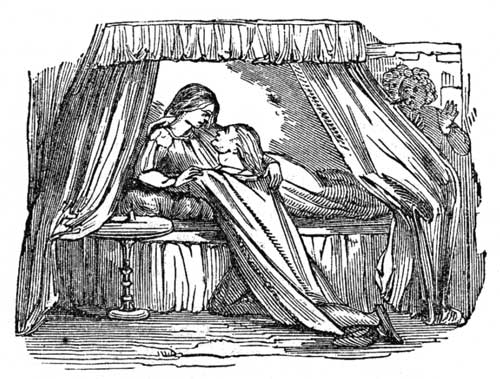
On awaking next morning, Beauty found herself in her father's cottage, and his delight on seeing her alive soon restored his health. He sent for her sisters, who presently came accompanied by their husbands, with whom they lived very unhappily, as one was so vain of his person that he thought nothing of his wife, and the other so sarcastic that he was playing off his wit all day long on everybody around him,[Pg 30] and most of all on his lady. The sisters were so jealous on finding Beauty magnificently dressed, and hearing how kind the Beast was to her, that they laid a plan for detaining her beyond the time allowed her to stay, in hopes he would be so angry as to devour her. Accordingly, when the week was over, they affected such grief at her departure, that Beauty agreed to a stay another week, though she could not help reproaching herself for so doing. But on the night of the tenth day, she dreamt she saw the Beast lying half dead on the grass in the palace garden, and waking all in tears, she got out of bed, laid her ring on[Pg 31] the table, and then went to bed again, where she soon fell asleep. She was quite relieved, on waking, to find herself back in the palace, and waited impatiently till supper time, but nine o'clock struck, and no Beast appeared. Beauty then seriously feared she had caused his death, and running into the garden towards the spot she had dreamt of, she saw the poor Beast lying senseless on the grass. She threw herself upon his body in despair, when feeling that his heart still beat, she ran to fetch some water from a neighbouring stream, and threw it into his face. The Beast opened his eyes[Pg 32] saying in a faint voice: “You forgot your promise, and I determined to starve myself to death; but since you are come, I shall, at least, die happy.” “No! you shall not die, dear Beast,” cried Beauty, “you shall live to be my husband, for I now feel I really love you.” No sooner had she spoken these words, than the palace was brilliantly illuminated, fireworks were displayed, and a band of music struck up. The Beast had disappeared, and in his place, a very handsome prince was at her feet, thanking her for having broken his enchantment. “But where is my poor Beast?” said Beauty anxiously. “He is now before you,” said the prince. “A wicked fairy condemned me to retain that uncouth form till some beautiful maid had sufficient goodness to love me in spite of my ugliness.” Beauty, most agreeably surprised, now helped the prince to rise, and they returned to the palace, where she found her father. The young pair were then married, and the prince and his beautiful bride were heartily welcomed by his subjects, who had mourned his absence, and over whom they reigned happily for many, many long years.

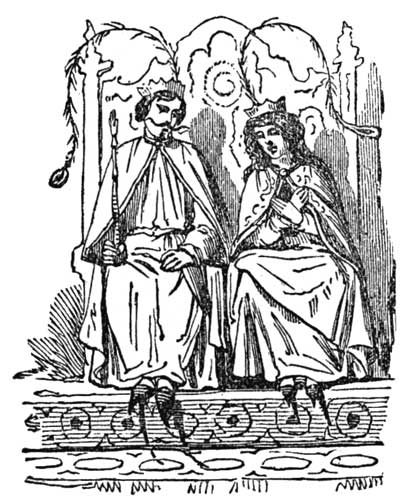
There once lived a king and a queen who had two very fine boys. The queen always invited the fairies, on the birth of her children, to foretel their fortunes; so when, some years after, a daughter was born, she again applied to her old friends. The little girl was so beautiful that the fairies were struck with admiration; but when questioned by the mother as to the future fate of Princess Rosetta (for such was her name), they one and all pretended to have left their conjuring-book at home, and said they would come another time. “Alas!” cried the queen, “this bodes no good. Yet I do entreat you to tell me the worst.” The more unwilling the fairies seemed to speak, the greater desire the queen felt to know what was the matter; so at length the principal fairy said: “We are afraid, Madam, that Rosetta will prove unlucky to her brothers, and that they will die in some adventure on her account. That is all that we are able to foresee about your pretty little girl.” They then departed, and left the queen very sad.
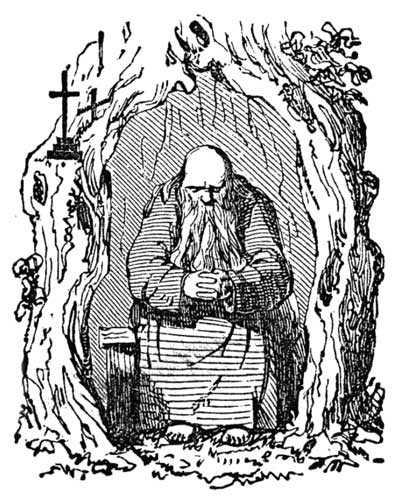
Some time after, the queen was told that there was an old hermit, who lived in the trunk of a tree, in a neighbouring wood, and whom everybody went to[Pg 35] consult. So she went and consulted the hermit, and he answered, that the best thing would be to shut the princess up in a tower, and never allow her to go abroad. The queen thanked him, and having made him a handsome present, came back and told the king what he had said. The king immediately ordered a high tower to be built, and when it was finished, he shut the princess up in it, though he went daily to see his daughter, accompanied by the queen and the[Pg 36] two princes, who were devotedly attached to their sister. By the time the princess was fifteen years of age the king and queen fell ill and died the same day, to the great grief of Rosetta and her brothers. The eldest son was now raised to the throne, when he said to his brother: “It is time we should let our sister out of the tower in which she has been so long shut up.” Accordingly they crossed the garden, and having entered the tower, Rosetta came to meet them, and said: “I hope, Sire, now that you are king, you will let me out of this tower, where I am so tired of being shut up.” And so saying she burst into tears. But the king told her not to cry, and that she should not only leave the tower, but soon be married. When Rosetta came down into the garden, she was delighted with all she saw, and ran about like a child to gather flowers and fruit, followed by her little dog Fretillon, who was as green as a parrot, and had long ears, but who danced most admirably. But when the princess caught sight of a peacock, she thought it the most beautiful creature in the world, and asked her brothers what it was. On being told that it was a bird that was occasionally eaten, she replied that it was a sin and a shame to eat such a beautiful bird,[Pg 37] and added, that she would never marry any one but the king of the peacocks, and then such a sacrilege should be forbidden. “But, sister,” said the king, greatly astonished, “where on earth can we find the king of the peacocks?” “That is your look-out,” said the young princess; “all I can say is, that no one else shall become my husband.”

The two brothers then led her to the palace, whither she insisted on having the peacock removed, and put into her chamber. All the ladies of the court, who[Pg 38] had not seen Rosetta, then came to pay their respects to her, and brought her a variety of presents, which she received with such infantine grace and pretty gratitude, as to delight everybody. The king and his brother were thinking, meanwhile, how they should contrive to find the king of the peacocks. At length they had Rosetta's picture taken, and a speaking likeness it was, and with this they set off on their difficult errand, leaving the princess to govern the kingdom during their absence.
They at last reached the kingdom of the Cockchafers, and such a buzzing there was in it, that the king thought he should go deaf or mad. At length he asked the one who appeared the most rational of the set, where he could find the king of the peacocks. “Please your majesty,” replied the cockchafer, “his kingdom is thirty thousand miles from hence, and you have taken the longest road to reach it.” “And pray, how can you know that?” said the king. “Because,” rejoined the cockchafer, “you and we are old acquaintances, for we spend two or three months in your gardens every year.” The king and his brother embraced the cockchafer for joy, and then they dined together; and after admiring all the curiosities of the[Pg 39] kingdom, where every leaf was worth a guinea, they continued their journey, till they reached a country where they saw all the trees were filled with peacocks, who made such a screeching that they were to be heard at least two leagues off. The king now said to his brother: “Should the king of the peacocks be himself a peacock, he will be an odd husband for our sister. What a pity it is she ever imagined that there existed such a king!” On reaching the capital, however, they found it inhabited by men and women, who wore dresses made of peacocks' feathers; and presently they saw the king coming out of his palace, in a beautiful little golden carriage studded with diamonds, and drawn by twelve peacocks. He was extremely handsome, and wore his fine, long, curly flaxen hair flowing on his shoulders, surmounted by a crown of peacocks' feathers. On perceiving the two strangers he stopped the carriage, and inquired what had brought them to his kingdom. The king and prince then said they came from afar to shew him a beautiful portrait, and accordingly drew forth Rosetta's likeness. The king of the peacocks after having attentively examined it, declared he could not believe there really existed so beautiful a maiden in the world. Upon[Pg 40] which the prince informed him that his brother was a king, and that the original of the portrait was their sister, the princess Rosetta, who was a hundred times more beautiful than here represented, and that they came to offer her to him in marriage, with a bushel of golden crowns for her portion. “I should willingly marry her,” replied the king of the peacocks, “but I must insist upon her being quite as beautiful as the picture; and, should I find her inferior in the slightest respect, I will put you both to death.” “Agreed!” cried the brothers. “Well, then,” said the king, “you must go to prison till the princess arrives.” This they willingly did, and then wrote off to their sister to come immediately to marry the king of the peacocks, who was dying of love for her; but they said nothing about their being shut up, for fear of alarming her.
The princess was half wild with joy when she heard the king of the peacocks was really found, and she lost no time in setting off with her nurse, her foster-sister, and her little green dog Fretillon, who were the only companions she chose to take with her. They put to sea in a vessel loaded with a bushel of golden crowns, and with clothes enough for ten years, supposing the princess put on two new dresses every day.[Pg 41]
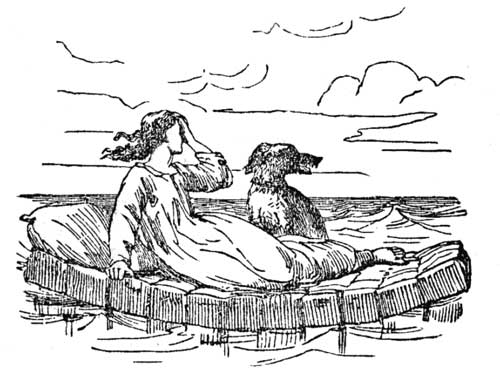
During the passage, the nurse kept asking the pilot how near they were to the kingdom of peacocks; and when at last he told her they would soon reach its shores, the wicked creature said, that if he would help her to throw the princess into the sea, as soon as she should be asleep that night, she could then dress up her daughter in her fine clothes, and present her to the king of the peacocks for his bride, and that she would give him gold and diamonds so as to make his fortune. The pilot thought it a pity to drown such a fair princess; but the nurse having plied him with wine until he was quite tipsy, he gave his consent,[Pg 42] and when night came, he helped her and her daughter to take up Rosetta, when she was fast asleep, mattress, feather-bed and all, and flung her into the sea. Fortunately the bed was stuffed with phoenix's feathers, which possess the virtue of not sinking, so that it kept floating like a barge. Still, the waves wetted it by degrees, and Rosetta, feeling uncomfortable, kept turning about in her sleep, till she woke her little dog, who lay at the foot of her bed. Fretillon had a very fine scent, and, as he smelt the soles and the cod, he barked aloud, which in turn woke the fish, who began to swim about and run foul of the princess's light craft, that kept twisting about like a whirlpool.
Meanwhile the wicked nurse had reached the shore, where she and her daughter found a hundred carriages waiting for them, drawn by a variety of animals, such as lions, stags, bears, wolves, horses, oxen, eagles, and peacocks. The coach intended for Princess Rosetta was drawn by six blue monkeys, caparisoned with crimson velvet. The nurse had drest up her daughter in the finest gown she could find, and loaded her head with diamonds; in spite of which, she appeared so frightful, with her squinting eyes, oily black hair, crooked legs, and humped shoulder, that the persons[Pg 43] sent by the king of the peacocks to receive her, were struck with amazement at the sight of her. Being as cross as she was ill-favoured, she asked them tartly whether they were all asleep, and why they did not bring her something to eat; and then, distributing her blows pretty freely, she threatened to have them all hung if they did not shew a little more alacrity in doing her bidding. As she passed along in state, the peacocks perched on the trees cried out, “Fie! what[Pg 44] an ugly creature!” which enraged her so that she ordered her guards to go and kill all the peacocks; but they flew away and only laughed at her the more. When the pilot heard and saw all this, he whispered to the nurse: “We are in the wrong box, mistress;” but she bid him hold his peace.
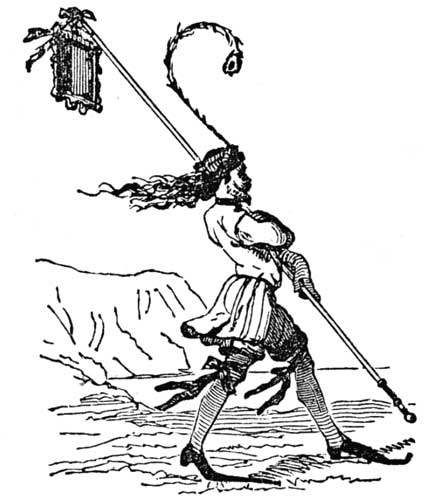
When the king came forth to meet her, accompanied by all his nobles, his peacocks, and the foreign ambassadors staying at his court, preceded by Rosetta's portrait at the end of a long pole, he was ready to die with rage and vexation on seeing such a fright; and, without more ado, he ordered her to be shut up, together with the nurse and the pilot, in the tower prison. His rage next fell upon the two princes, whom he accused of making game of him; and they were much surprised when, instead of being released on their sister's arrival, they were transferred to a horrible dungeon, where they remained up to their necks in water for three days. At the end of that time, the king of the peacocks came and insulted them through a loop-hole, and told them they were a couple of adventurers, whom he would have hung; upon which, the elder prisoner replied indignantly, that he was as good a king as himself, and that he might[Pg 45] some day repent his insolent behaviour. Seeing him so firm, the king of the peacocks had almost a mind to release them at once, and send them away with their sister, but one of his courtiers persuaded him that his dignity required he should punish the strangers; so he had them tried, and they were condemned to be executed for having told a falsehood, and promising the king a beautiful bride, who had turned out a horrible fright. When they heard this sentence, they protested so vehemently that there must be some misunderstanding, which time would clear up, that they obtained a week's respite. Meanwhile, the poor princess, who was greatly surprised on waking to find herself in the middle of the sea, began to weep bitterly, and fancied she had been cast into the waves by order of the king of the peacocks. After being tossed about for a couple of days, during which she would have died of hunger had she not chanced to pass near a bed of oysters, Fretillon's incessant barking attracted the notice of a good old man, who lived in a solitary hut on the shore. Thinking some travellers had lost their way, he came out to help them, when he was much surprised on beholding the princess in her water bed, calling out to him to save her life. The old man ran[Pg 46] back to fetch a grapple, and towed the bed ashore with some difficulty, and the princess having wrapt herself in the counterpane, followed him to his cottage, where he lit a fire, and gave her some clothes that once belonged to his late wife. Seeing that she must be a lady of high degree, by the richness of the bed-clothes, which were of satin, embroidered with gold and silver, the old man questioned her, and having learnt her story, he offered to go and inform the king of her arrival, reminding her that she would not have[Pg 47] proper fare in his poor house. But Rosetta would not hear of such a thing, and preferred borrowing a basket, which she fastened to Fretillon's neck, saying, “Go and fetch me pot-luck from the best kitchen in the town.” Fretillon set off; and, as there was no better than the king's, he stole all that was in the pot, and came back to his mistress. She then sent him back to the pantry to fetch bread, wine, and fruit. Now, when the king of the peacocks wanted to dine, there was nothing left, either in the pot or the pantry, so he was in a great rage, and he ordered some joints to be roasted, that he might, at least, make a good supper. But when evening came, the princess sent Fretillon to fetch some joints from the best kitchen, and the little dog again went to the palace, and, whipping the joints off the spit while the cook's back was turned, he filled his basket and returned home. The king having missed his dinner, wished to sup earlier than usual, when again nothing was to be had, and he went to bed in a perfect fury. The same thing happened the next day, both at dinner and at supper, so that for three days the king never tasted a morsel; and this might have gone on much longer had not a courtier concealed himself in the kitchen, and disco[Pg 48]vered the four-footed thief, and followed him to the cottage. The king immediately ordered the inmates of the cottage and the dog to be taken into custody, and determined they should be put to death with the two strangers, whose respite was to expire on the morrow. He then entered the hall of justice to judge the culprits. The old man knelt before him, and told him Rosetta's whole story; and when the king cast his eyes upon her, and saw how beautiful she was, he jumped for joy, and untied the cords that bound her. Meantime the two princes were sent for, together with the nurse and her daughter; and when they had all met, Rosetta fell on her brothers' necks, while the guilty nurse and her daughter, and the pilot, knelt down to implore forgiveness. The king was so delighted that he pardoned them, and rewarded the old man handsomely, and insisted on his remaining in his palace. The king of the peacocks next did all he could to make up for the ill-usage the king and the prince had suffered. The nurse returned the bushel of golden crowns and Rosetta's fine clothes; and the wedding rejoicings lasted a whole fortnight. So everybody was satisfied, not forgetting Fretillon, who was fed with all sorts of dainties for the rest of his life.
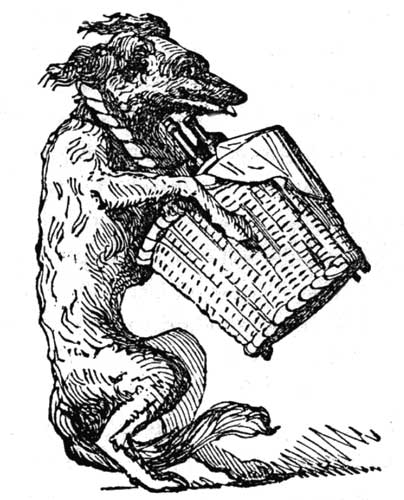

In a retired and pleasant village there once lived a little girl, who was one of the prettiest children ever seen. Her mother loved her to excess, and as to her grandmother, she was doatingly fond of her, and looked upon her as the delight of her eyes, and the comfort of her declining years. The good old dame had a little hood of scarlet velvet made for her darling, which became her so daintily, that for miles round she had been nicknamed Little Red Riding Hood.
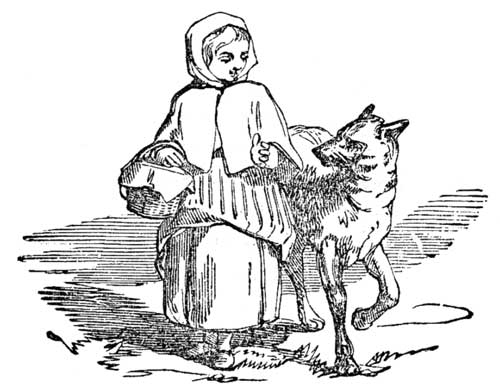
One day, when her mother had baked a batch of cakes, she said to Little Red Riding Hood: “I hear your poor grandam has been ailing, so, prithee, go and see if she be any better, and take her this cake and a little pot of butter.” Little Red Riding Hood, who was a willing child, and always ready to be useful, put the things into a basket, and immediately set off for the village where her grandmother lived, which lay on the other side of a thick wood. As she reached the outskirts of the forest, she met a wolf,[Pg 52] who would have liked vastly to have devoured her at once, had there not been some woodcutters near at hand, whom he feared might kill him in turn. So he sidled up to the little girl, and said, in as winning a tone as he could assume: “Good morning, Little Red Riding Hood.” “Good morning, Master Wolf,” answered she, who had no idea of being afraid of so civil spoken an animal. “And pray where may you be going so early?” quoth the wolf. “I am going to my grandmother's,” replied Little Red Riding Hood, who thought there could be no harm in telling him. “And[Pg 53] what are you carrying in your basket, my pretty little maid?” continued the wolf, sniffing its contents. “Why, a cake and a pot of butter,” answered simple Little Red Riding Hood, “because grandmother has been ill.” “And where does poor grandmamma live?” inquired the wolf, in a tone of great interest. “Down beyond the mill, on the other side of the wood,” said she. “Well,” cried the wolf, “I don't mind if I go and see her too. So I'll take this road, and do you go through the wood, and we'll see which of us shall be there first.”
Now, the wily wolf knew well enough that he would be the winner in such a race. For, letting alone his four feet against poor Little Red Riding Hood's two, he could dash through the underwood, and swim across a pond, that would bring him by a very short cut to the old grandam's cottage, while he shrewdly guessed that the little girl would stop to gather strawberries, or to make up a posy, as she loitered along the pleasanter but more roundabout path through the wood. And sure enough the wolf, who cared neither for strawberries nor for flowers, made such good speed that he had presently reached the grandmother's cot[Pg 54]tage. Thump, thump, went the wolf against the door. “Who is there?” cried the grandam from within. “Only your grandchild, Little Red Riding Hood,” cried the wolf, imitating the little girl's shrill infantine voice as best he might. “I have come to bring you a cake and a pot of butter that mother sends you.” The grandmother, being ill, was in bed, so she called out: “Lift the latch, and the bolt will fall.” The wolf did so, and in he went, and, without saying a word more, he fell upon the poor old creature, and ate her up in no time, for he had not tasted food for the last three days. He next shut the door, and, putting on the grandam's nightcap and nightgown, he got into bed, drew the curtain, and buried his head in the pillow, and kept laughing in his sleeve at the trick he meant to put upon poor Little Red Riding Hood, and wondering how long she would be before she came.
Meanwhile Little Red Riding Hood rambled through the wood with child-like glee, stopping every now and then to listen to the birds that were singing so sweetly on the green boughs, and picking strawberries, which she knew her grandam loved to eat with cream,[Pg 55] till she had nearly filled her basket; nor had she neglected to gather all the pretty flowers, red, blue, white, or yellow, that hid their sweet little heads amidst the moss; and of these her apron was at last so full, that she sat down under a tree to sort them and wind them into a wreath.
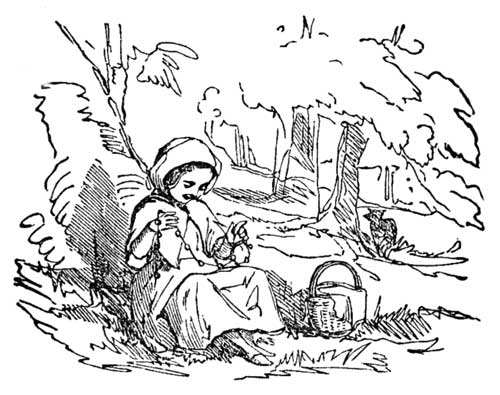
While she was thus occupied, a wasp came buzzing along, and, delighted at finding so many flowers without the trouble of searching for them, he began to drink up their honey very voraciously. Little Red[Pg 56] Riding Hood knew well the difference of a wasp and a bee—how lazy the one, and how industrious the other—yet, as they are all God's creatures, she wouldn't kill it, and only said: “Take as much honey as you like, poor wasp, only do not sting me.” The wasp buzzed louder, as if to thank her for her kindness, and, when he had sipped his fill, flew away. Presently, a little tom-tit, who had been hopping about on a bough opposite, darted down on the basket, and pecked at one of the strawberries. “Eat as much as you like, pretty tom-tit,” said Little Red Riding Hood: “there will still be plenty left for grandam and for me.” The tom-tit replied, “Tweat—tweat,” in his own eloquent language; and, after gobbling up at least three strawberries, flew away, and was soon out of sight. Little Red Riding Hood now bethought her it was time to go on; so, putting her wreath into her basket, she tripped along demurely enough till she came to a brook, where she saw an aged crone, almost bent double, seeking for something along the bank. “What are you looking for, goody?” said the little girl. “For water-cresses, my pretty maid,” mumbled the poor old woman; “and a sorry trade it is, that does not[Pg 57] earn me half enough bread to eat.” Little Red Riding Hood thought it very hard the poor old creature should work and be hungry too, so she drew from her pocket a large piece of bread, which her mother had given her to eat by the way, and said: “Sit down, goody, and eat this, and I will gather your water-cresses for you.” The old woman willingly accepted the offer, and sat down on a knoll, while Little Red Riding Hood set to work in good earnest, and had presently filled her basket with water-cresses. When her task was finished, the old crone rose up briskly, and, patting the little maid's head, said, in quite a different voice “Thank you, my pretty Little Red Riding Hood and now, if you happen to meet the green huntsman as you go along, pray give him my respects, and tell him there is game in the wind.” Little Red Riding Hood promised to do so, and walked on; but presently she looked back to see how the old woman was getting along, but, look as sharp as she might, she could see no trace of her, nor of her water-cresses. She seemed to have vanished clean out of sight. “It is very odd,” thought Little Red Riding Hood to herself, “for surely I can walk faster than she.” Then[Pg 58] she kept looking about her, and prying into all the bushes, to see for the green huntsman, whom she had never heard of before, and wondered why the old woman had given her such a message. At last, just as she was passing by a pool of stagnant water, so green that you would have taken it for grass, and have walked into it, as Little Red Riding Hood, who had never seen it before, though she had gone that same way often enough, had nearly done, she perceived a huntsman clad in green from top to toe, standing on the bank, apparently watching the flight of some birds that were wheeling above his head. “Good morning, Master Huntsman,” said Little Red Riding Hood; “the old water-cress woman sends her service to you, and says there is game in the wind.” The huntsman nodded assent, and bent his ear to the ground to listen, and then drew out an arrow tipped with a green feather, and strung his bow, without taking any further notice of Little Red Riding Flood, who trudged onwards, wondering what it all meant.
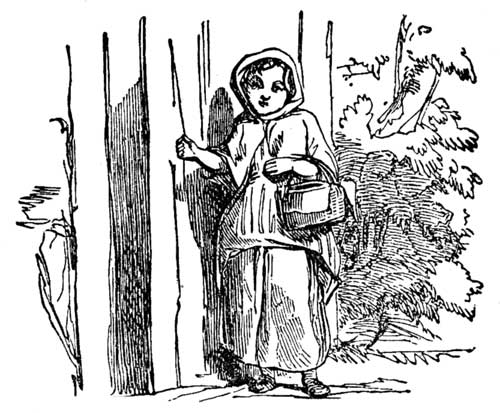
Presently the little girl reached her grandmother's well-known cottage, and knocked at the door.[Pg 59] “Who is there?” cried the wolf, forgetting to disguise his voice. Little Red Riding Hood was somewhat startled at first; then thinking her grandam had a bad cold that made her very hoarse, she answered, “It is your grandchild, Little Red Riding Hood, who has brought you a cake and a little pot of butter, which mother sends you.” The wolf then softened his voice a little, as he replied: “Lift the latch, and the bolt will fall.” Little Red Riding Hood did as she was told, and then entered the cottage. The[Pg 60] wolf then hid his head under the bed-clothes, and said: “Put the cake and the pot of butter on the shelf, my dear, and then come and help me to rise.” Little Red Riding Hood set down her basket, and then went and drew back the curtain, when she was much surprised to see how oddly her grandmother looked in her night-clothes. “Dear me! grandmamma,” said the little girl, “what long arms you have got!” “The better to hug you, my child,” answered the wolf.

“But, grandmamma, what long ears you have got!” persisted Little Red Riding Hood.
“The better to listen to you, my child,” replied the wolf.
“But, grandmamma, what large eyes you have got!” continued the little girl.
“The better to see you, my child,” said the wolf.
“But, grandmamma, what terrible large teeth you have got!” cried Little Red Riding Hood, who now began to be frightened.
“The better to eat you up,” exclaimed the wolf, who was just about to make a spring at the poor little girl, when a wasp, who had followed her into the cottage, stung the wolf in his nostril, and made him sneeze aloud, which gave the signal to a tom-tit perched on a branch near the open casement, who called out “Tweat—tweat,” which warned the green huntsman, who accordingly let fly his arrow, that struck the wolf right through the ear and killed him on the spot.
Little Red Riding Hood was too frightened, even after the wolf had fallen back dead, that she bounced out of the cottage, and, shutting the door, darted[Pg 62] into the forest like a frightened hare, and ran till she was out of breath, when she dropped down quite exhausted under a tree. Here she discovered that she had mistaken the road, when, to her great relief, she espied her old friend the water-cress woman, at some distance; and, feeling sure she could soon overtake the aged dame, she again set off, calling out to her every now and then to stop. The old crone, however, seemed too deaf to hear; and it was not till they had reached the skirts of the forest that she turned round, when, to Little Red Riding Hood's surprise, she perceived a young and beautiful being in place of the decrepit creature she thought she was following. “Little Red Riding Hood,” said the fairy, for such she was, “your goodness of heart has saved you from a great danger. Had you not helped the poor old water-cress woman, she would not have sent word to the green huntsman, who is generally invisible to mortal eyes, to save you. Had you killed the wasp, or driven away the tom-tit, the former could not have stung the wolf's nostril and made him sneeze, nor the latter have given the huntsman the signal to fly his shaft. In future, no wild beast shall ever harm[Pg 63] you, and the fairy folks will always be your friends.” So saying, the fairy vanished, and Little Red Riding Hood hastened home to tell her mother all that had befallen her; nor did she forget that night to thank Heaven fervently for having delivered her from the jaws of the wolf.
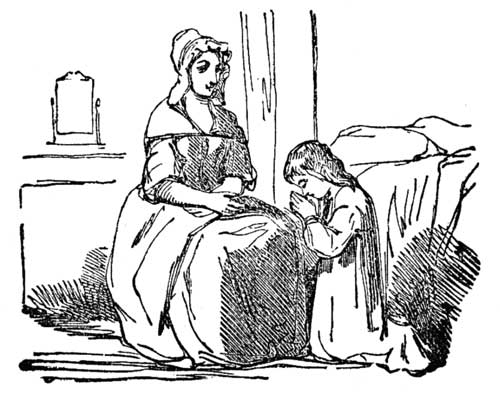

There once lived a king and queen, who had been married many years without having any children, which was a subject of great sorrow to them. So when at length it pleased Heaven to send them a daughter, there was no end to the rejoicings that were made all over the kingdom, nor was there ever so grand a christening seen before. All the fairies in the land were invited to stand godmothers to the little princess, in the hope that each would endow her with some gift, as was customary in those days; by which means she would be adorned with every perfection and accomplishment that could be devised.
When the christening was over, the company returned to the king's palace, where a banquet was prepared for the fairies, seven in number, who had graced the ceremony with their presence. Before each fairy was laid a splendid cover, with a case of massive gold containing a knife, a fork, and a spoon of the purest gold, ornamented with diamonds and rubies. Just[Pg 68] as they were going to sit down, in came an aged fairy who had not been invited, because, having remained shut up in a tower for more than fifty years, she was supposed to be either dead or under the influence of some spell. The king immediately ordered a cover to be laid for her, but he could not give her a golden case like the others, as only seven had been made, for the seven fairies. The old crone consequently thought herself treated with disrespect, and muttered sundry threats betwixt her teeth, which happened to be overheard by one of the young fairies, who, fearing she might bestow some fatal gift on the baby princess, had no sooner risen from table than she went and concealed herself behind the tapestry-hangings, in order that she might speak the last, and be able to neutralize, if possible, any mischief the ill-natured hag might intend doing.
The fairies now began to bestow their gifts. The youngest endowed her with surpassing beauty; another gave her wit; a third imparted grace; a fourth promised that she should dance to perfection; a fifth, that she should sing like a nightingale; and the sixth, that she should play on all sorts of instruments in the[Pg 69] most exquisite manner. It was now the old fairy's turn to speak; when, coming forward, with her head shaking from spite still more than from age, she declared the princess would prick her hand with a spindle, and die of the wound.

This terrible sentence fell like a damp upon all the company, and there was no one present but what shed tears. But just then the young fairy came out from behind the tapestry-hangings, and said aloud: “Be comforted, O king and queen: your daughter shall not die[Pg 70] of the wound. For although I have not the power to undo completely the mischief worked by an older fairy, and though I cannot prevent the princess from pricking her hand with a spindle, yet, instead of dying, she shall only fall into a sleep, that will last a hundred years, at the end of which a king's son will come and wake her.”
Notwithstanding the fairy's words, the king, in hopes of averting such a misfortune altogether, published an edict forbidding any person to make use of spindles, or even to keep them in their house, under pain of death.
Some fifteen or sixteen years afterwards, it happened that the king and queen went to visit one of their summer palaces; when the young princess, running one morning all over the rooms, in the frolicsome spirits of youth, at length climbed up one of the turrets, and reached a little garret, where she found an old woman busy spinning with a distaff. The poor soul had never even heard of the king's edict, and did not dream that she was committing high treason by using a spindle.[Pg 71]
“What are you doing, goody?” cried the princess. “I am spinning, my pretty dear,” replied the old woman, little thinking she was speaking to a princess. “Oh! how amusing it must be,” cried the princess, “I should so like to try! Pray show me how to set about it.” But no sooner had she taken hold of the spindle, than, being somewhat hasty and careless, and likewise because the fairies had ordered it to come to pass, she pricked her hand, and fell down in a dead faint.

The good old woman becoming alarmed, called[Pg 72] aloud for help, and a number of attendants flocked round the princess, bathed her temples with water, unlaced her stays, and rubbed the palms of her hands, but all to no purpose. The king, who had come up stairs on hearing the noise they made, now recollected what the fairies had foretold, and seeing there was no help for it, ordered the princess to be laid on a bed, embroidered in gold and silver, in the most magnificent room in the palace. She looked as lovely as an angel, while thus lying in state, though not dead, for the roses of her complexion and the coral of her lips[Pg 73] were unimpaired; and though her eyes remained closed, her gentle breathing showed she was only slumbering. The king ordered her to be left quite quiet, until the time should come when she was to awake. The good fairy who had saved her life, by condemning her to sleep for a hundred years, was in the kingdom of Mataquin, some twelve thousand miles off, when the accident occurred; but, having quickly heard the news through a little dwarf, who possessed a pair of seven-league boots, she lost no time in coming to see her royal friends, and presently arrived at the palace in a fiery chariot drawn by dragons. The king went to hand her out of the carriage. She approved of all he had done; but, being extremely prudent, she foresaw that when the princess would come to wake she would be puzzled what to do on finding herself all alone in a large palace, and therefore adopted the following expedient. She touched with her wand all the ladies in waiting, maids of honour, ladies' maids, gentlemen, officers, stewards, cooks, scullions, running footmen, guards, porters, pages, valets, in short, every human being in the palace, except their two majes[Pg 74]ties; she next went into the stables, and touched all the horses, with their grooms, the large dogs in the court-yard, and, lastly, the princess's little lapdog, that lay beside her on the bed. No sooner had she done so, than one and all fell into a sound sleep that was to last till their mistress should wake, in order to be ready to attend her the moment she would require their services. Even the spits before the fire, that were roasting some savoury partridges and pheasants, seemed in a manner to fall asleep, as well as the fire itself. And all this was but the work of a moment, fairies being never very long doing their spiriting.
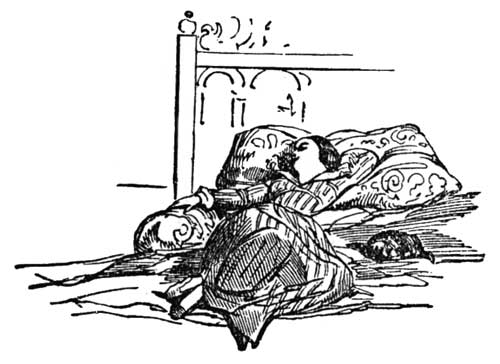
The king and queen, after having kissed their beloved child, without waking her, left the palace, and published a decree forbidding any one to approach the spot. But this proved quite a needless precaution, for in a quarter of an hour's time there sprung up all around the park such a quantity of trees, both great and small, and so thick a tangle of briars and brambles, that neither man nor beast could have found means to pass through them; in short, nothing[Pg 75] but the topmost turrets of the castle could be seen, and these were only discernible at a distance. So that it seemed the fairy was determined the princess's slumber should not be disturbed by idle curiosity.
At the end of one hundred years, the son of the king who then reigned over the land, and who did not belong to the same family as the sleeping princess, happened to go a hunting one day in that neighbourhood, and, catching a glimpse of the turrets peeping above a thick wood, inquired what building it was that he saw. Every one answered according to what they had heard. Some said it was an old castle, that was haunted; others, that it was a place of meeting for all the witches in the land; while the most prevailing opinion was, that it belonged to an ogre, who was in the habit of stealing little children, and carrying them home to eat them unmolested, and nobody could follow him, since he alone had the power of penetrating through the thicket. The prince did not know what to make of all these different accounts, when an old peasant said to him: “Please your royal highness, it is now above fifty years since I heard my father tell that the most beautiful princess ever seen[Pg 76] was concealed in this palace, where she was condemned to sleep for a hundred years, at the end of which she was to be awakened by a king's son, whose bride she was destined to become.”
On hearing this, the young prince's fancy was so inflamed with the hope of being himself the hero destined to end the enchantment, that he immediately determined to ascertain how far the legend might prove true. No sooner did he reach the wood, than the large trees, as well as the briars and brambles, opened a passage for him of their own accord. He now advanced towards the castle, which he could perceive at the end of a long avenue, but, to his surprise, he found that none of his attendants had been able to follow him, the trees having closed upon them the moment he had passed through. Nevertheless, he proceeded on his way without the least concern, for a young prince who begins to feel himself in love must needs be brave. So he entered the outer court-yard, where he witnessed a sight that might have appalled one less resolute than himself. The image of death was everywhere present. The bodies of men and[Pg 77] animals lay strewn about, apparently lifeless, and the silence was truly awful. Still, he soon perceived, by the rubicund noses and jolly faces of the porters, that they were only asleep; while their goblets, still retaining a few drops of wine, proved beyond a doubt that sleep had surprised them in the midst of a drunken bout. He then passed through a large court, paved with marble, and entered the guard-room, where he found a double row of soldiers shouldering their carbines, and snoring loudly. He next crossed through several rooms, full of ladies and gentlemen in waiting,[Pg 78] some standing and some sitting, but all fast asleep; and at length entered a gilt chamber, where, upon a magnificent bed, the curtains of which were drawn back, he saw reclining a princess, apparently about sixteen, and of the most resplendent beauty that had ever met his sight. He felt impressed with such admiration for her loveliness that he could not refrain from bending his knee before her.
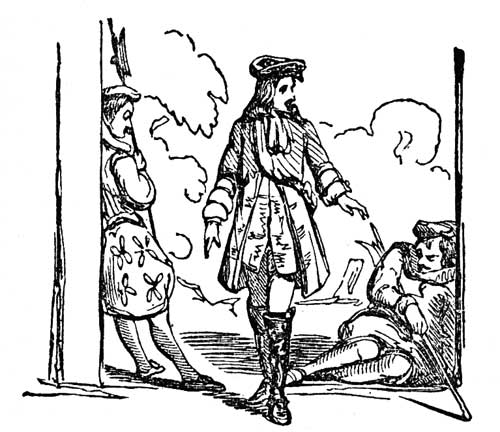
Just at that moment the period of the enchantment came to a close, the princess awoke, and, looking at him with more fondness than a first interview would seem to warrant, she exclaimed: “Is it you, dear prince? How long I've been waiting for you!” The prince was so charmed by these words, and the manner in which they were uttered, that, feeling quite at a loss how to express his gratitude and delight, he could only assure the fair sleeper that he loved her far better than he did himself. But though he did not make any set speeches, his conversation was only the more acceptable to the princess, who, on her part, was much less timid and awkward than her lover, which is not to be wondered at, as we may fairly conclude that she had had ample time—namely,[Pg 79] a century—to consider what she should say to him, for it is not to be supposed but what the good fairy gave her agreeable dreams during her long slumber. However that may be, they now talked for about four hours, without having said half of what they had to say to each other.
All the inmates of the palace having awoke at the same time as the princess, each began to discharge the duties of his or her office; and, as they were not all in love, like their mistress, they felt very hungry. The lady in waiting, out of all patience, at length told the princess that supper was ready. The prince then gave her his hand to help her to rise, for she was ready dressed in the most magnificent clothes, though he took care not to observe that they were cut on the pattern of those of his grandmother, and that she wore a ruff, which was not now in fashion, but she looked quite as beautiful as if her dress had been more modern.
They then went into the hall of looking-glasses, where they supped to the sound of music, which was well executed by an orchestra of violins and hautboys[Pg 80] although the tunes they played were at least a century out of date. After supper, the chaplain united the happy pair, and the next day they left the old castle and returned to court, where the king was delighted to welcome back the prince and his lovely bride, who was thenceforward nicknamed, both by her contemporaries and by the chroniclers who handed down the legend, the Sleeping Beauty in the Wood.
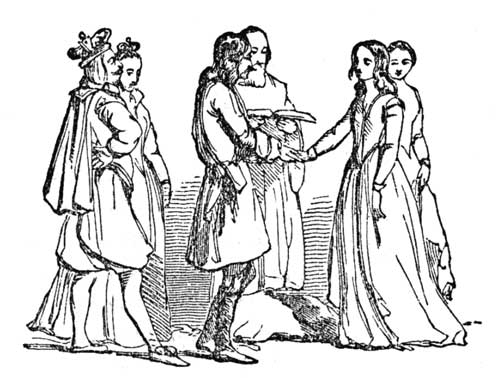
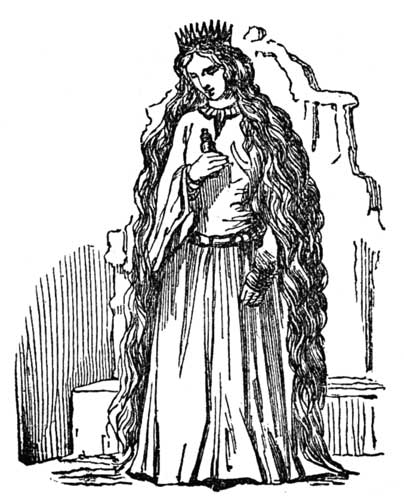
There was once a princess who had such a beautiful head of hair, streaming down in curls to her feet, and brilliant as a sunbeam, that she was universally called the Fair One with Golden Locks. A neighbouring king, having heard a great deal of her beauty, fell in love with her upon hearsay, and sent an ambassador with a magnificent suite to ask her in marriage, bidding him be sure and not fail to bring the princess home with him. The ambassador did his best to fulfil the king's commands, and made as fair a speech as he could to persuade the lady; but, either she was not in a good temper that day, or his eloquence failed to move her, for she answered, that she thanked the king, but had no mind to marry. So the ambassador returned home with all the presents he had brought, as the princess would not accept anything of a suitor whom she refused, much to the grief of the king, who had made the most splendid preparations to receive her, never doubting but what she would come.
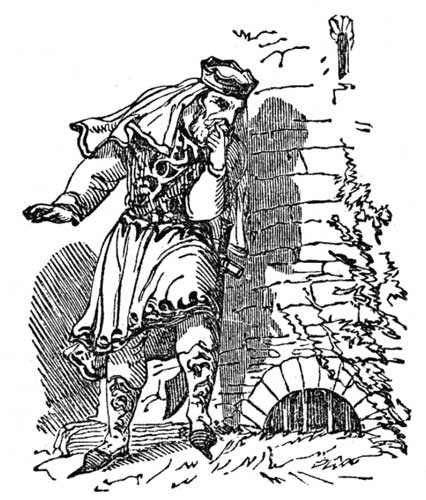
Now there happened to be at court a very handsome young man, named Avenant, who observed, that had he been sent to the Fair One with Golden Locks,[Pg 83] he would certainly have persuaded her to come; whereupon some ill-natured persons, who were jealous of the favour he enjoyed, repeated his words to the king, as though he had meant to boast that, being handsomer than his majesty, the princess would certainly have followed him. This threw the king into such a rage, that he ordered poor Avenant to be thrown into a dungeon, where he had nothing but straw to lie upon, and where he would have died of exhaustion had[Pg 84] it not been for a little spring that welled forth at the foot of the tower in which he was confined. One day, when he felt as if he were near his end, he could not help exclaiming: “What have I done? and what can have hardened the king's heart against the most faithful of all his subjects?” It chanced that the king passed by just as he uttered these words, and, being melted by his former favourite's grief, he ordered the prison door to be opened, and bid him come forth. Avenant fell at his feet, entreating to know the cause of his disgrace. “Did you not make game both of myself and my ambassador?” said the king; “and did you not boast, that had I sent you to the Fair One with Golden Locks, you would have prevailed on her to return with you?” “True, Sire,” replied Avenant; “for I should have set forth all your great qualities so irresistibly, that I am certain she could not have said nay. Methinks there is no treason in that.” The king was so convinced of his innocence, that he straightway released Avenant from prison and brought him back to the palace. After having given him a good supper, the king took him into his cabinet, and confessed to him that he was still so in love with the Fair One with Golden Locks, that he had a great[Pg 85] mind to send him to obtain her hand, and meant to prepare a splendid equipage befitting the ambassador of a great nation. But Avenant said: “That is not necessary. Only give me a good horse and the necessary credentials, and I will set off to-morrow.”
On the following morning Avenant left the court, and set out alone on his journey, thinking as he went of all the fine things he should say to the princess, and stopping ever and anon, when any pretty conceit came into his head, to jot it down on his tablets. One day as he halted for this purpose in a lovely meadow by the side of a rivulet, he perceived a large golden carp that lay gasping upon the grass, having jumped so high to snap at the flies, that she had overreached herself, and was unable to get back into the water. Avenant took pity on her, and, gently lifting her up, restored her to her native element. The carp took a plunge to refresh herself, then reappearing on the surface she said: “Thanks, Avenant, for having saved my life. I will do you a good turn if ever I can.” So saying she dived back into the water, leaving Avenant greatly surprised at her civility.
Another time, he saw a crow closely pursued by a large eagle, when, thinking it would be a shame not[Pg 86] to defend the weak against the strong, he let fly an arrow that brought the cruel bird of prey to the ground, while the crow perched upon a tree in great delight, crying: “It was very generous of you, Avenant, to help a poor crow like me. But I will prove grateful, and do you a good turn whenever I can.”
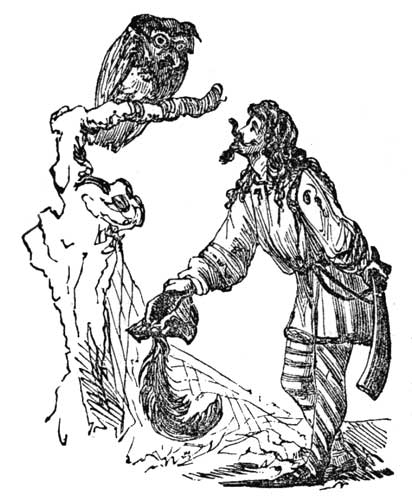
Avenant was pleased with the crow's good feelings and continued his journey; when, some days after, as[Pg 87] he crossed a thick wood, he heard an owl hooting, as if in great distress. After looking about him on all sides, Avenant found the poor owl had got entangled in a net. He soon cut the meshes, and set him free. The owl soared aloft, then, wheeling back, cried, “Avenant, I was caught, and should have been killed without your help. But I am grateful, and will do you a good turn when I can.”
Such were the principal adventures that befel Avenant on his journey. When, at last, he reached the capital, where resided the Fair One with Golden Locks, it appeared so magnificent that he thought he should be lucky indeed if he could persuade her to leave such wonders, to come and marry the king, his master. He, however, determined to do his best; so, having put on a brocaded dress, with a richly-embroidered scarf, and hung round his neck a small basket, containing a beautiful little dog he had bought on the road, he asked for admittance at the palace gate with such graceful dignity that the guards all bowed respectfully, and the attendants ran to announce the arrival of another ambassador, named Avenant, from the king, her neighbour.
The princess bid her women fetch the blue bro[Pg 88]caded satin gown, and dress her hair with fresh wreaths of flowers; and, when her toilet was completed, she entered her audience chamber, where Avenant was waiting for her. Though dazzled at the sight of her rare beauty, he nevertheless delivered an eloquent harangue, which he wound up by entreating the princess not to give him the pain of returning without her. “Gentle Avenant,” replied she, “your speech is fair; but you must know, that, a month ago I let fall into the river a ring that I value above my kingdom, and I made a vow at the time, that I would never listen to a marriage proposal from anybody, unless his ambassador recovered my lost treasure. So you see, were you to talk till doomsday, you could not shake my determination.”
Avenant, though surprised and vexed at such an answer, made a low bow, and requested the princess's acceptance of the dog, the basket, and the scarf he wore; but she refused his proffered gifts, and bid him consider of what she had said.
Avenant went to bed supperless that night; nor could he close his eyes for a long while, but kept lamenting that the princess required impossible things to put him off the suit he had undertaken. But his[Pg 89] little dog Cabriole bid him be of good cheer, as fortune would no doubt favour him; and though Avenant did not much rely on his good luck, he at length fell asleep from sheer exhaustion.

The next morning Cabriole woke up his master who dressed himself and went to take a walk. His feet insensibly carried him to the river side, when he heard a voice calling out: “Avenant! Avenant!” He looked about him, but seeing no one, was proceeding[Pg 90] on his way, when Cabriole, who was looking at the water, cried: “Why, master, as I'm alive, it is a golden carp that is hailing you.” Upon which the carp approached, saying: “You saved my life in the meadow, and I promised to be grateful. So here is the ring you are seeking for, gentle Avenant.”
He then hastened to the palace, and, requesting an audience of the princess, he presented her the ring, and asked whether she had any objection now to marry his master? On seeing her ring she was greatly amazed; but, being intent on putting him off once more, she replied: “Since you are so ready to fulfil my behests, most gracious Avenant, I pray you do me another service, without which I cannot marry. There lives not far from hence a giant named Galifron, who has threatened to ravage my kingdom unless I granted him my hand. But I could not resolve to marry a monster who is as tall as a tower, who carries cannons in his pocket to serve for pistols, and whose voice is so loud that people grow deaf if they approach too near him. He is daily killing and eating my subjects, and if you want to win my good graces on your master's behalf, you must bring me the giant's head.[Pg 91]”
Avenant was taken somewhat aback at this proposal; yet, after a few moments reflection, he said, “Well, madam, I am ready to fight Galifron; and, though I may not conquer, I can, at least, die the death of a hero.” The princess, who had never expected Avenant would consent, now sought to dissuade him from so rash an attempt; but all she could say proved vain; and, having equipped himself for the fight, he mounted his horse and departed.
As he approached Galifron's castle, he found the road strewed with the bones and carcases of those whom he had devoured or torn to pieces; and presently the giant emerged from a wood, when, seeing Avenant with his sword drawn, he ran at him with his iron club, and would have killed him on the spot, had not a crow come and pecked at his eyes, and made the blood stream down his face; so that, while he aimed his blows at random, Avenant plunged his sword up to the hilt into his heart. Avenant then cut off his head, and the crow perched on a tree, saying: “I have not forgotten how you saved my life by killing the eagle. I promised to do you a good turn, and I have kept my word.” “In truth I am greatly beholden to you, master crow,[Pg 92]” quoth Avenant, as he mounted his horse, and rode off with Galifron's head.

When he reached the city, the inhabitants gathered round him, and accompanied him with loud cheers to the palace. The princess, who had trembled for his safety, was delighted to see him return. “Now madam,” said Avenant, “I think you have no excuse left for not marrying my liege lord.” “Yes, indeed I have,” answered she; “and I shall still refuse him unless you procure me some water from the fountain of beauty. This water lies in a grotto, guarded by two dragons. Inside the grotto is a large[Pg 93] hole full of toads and serpents, by which you descend to a small cellar containing the spring. Whoever washes her face with this water retains her beauty, if already beautiful, or becomes beautiful, though ever so ugly. It makes the young remain young, and the old become young again. So you see, Avenant, I cannot leave my kingdom without carrying some of this water away with me.” “Methinks, madam,” observed Avenant, “you are far too beautiful to need any such water; but, as you seek the death of your humble servant, I must go and die.”
Accordingly, Avenant set out with his faithful little dog, and at last reached a high mountain, from the top of which he perceived a rock as black as ink, whence issued clouds of smoke. Presently out came a green and yellow dragon, whose eyes and nostrils were pouring forth fire, and whose tail had at least a hundred coils. Avenant drew his sword, and taking out a phial given him by the Fair One with Golden Locks, said to Cabriole, “I shall never be able to reach the water; so, when I am killed, fill this phial with my blood, and take it to the princess, that she may see what she has cost me, and then go and inform the king, my master, of the fate that has befallen me.[Pg 94]” While he was speaking, a voice called out: “Avenant! Avenant!” and he perceived an owl in the hollow of a tree, who said: “You freed me from the bird-catcher's net, and I promised to do you a good turn. So give me your phial, and I will go and fetch the water of beauty.” And away flew the owl, who, knowing all the turnings and windings of the grotto, soon returned bearing back his prize. After thanking the owl most heartily, Avenant lost no time in going back to the palace, where he presented the bottle to the princess, who now agreed to set out with him for his master's kingdom.
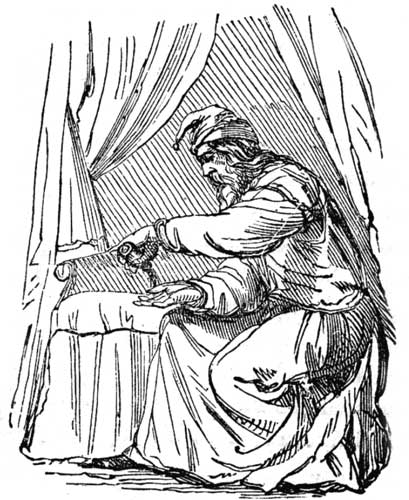
On reaching the capital, the king came forth to meet the Fair One with Golden Locks, and made her the most sumptuous presents. They were then married, amid great festivities and rejoicings; but the queen, who loved Avenant in her heart, could not forbear incessantly reminding the king, that had it not been for Avenant she would never have come, and that it was he alone who had procured her the water of beauty that was to preserve her ever youthful and beautiful. So it happened that some meddling bodies went and told the king that she preferred Avenant to himself, when he became so jealous that he ordered[Pg 95] his faithful subject to be thrown into prison, and fed upon nothing but bread and water. When the Fair One with Golden Locks heard of his disgrace, she implored the king to release him, but the more she entreated, the more obstinately his majesty refused. The king now imagined that his wife perhaps did not think him handsome enough, so he had a mind to try the effects of washing his face with the water of beauty. Accordingly, one night he took the phial from off the[Pg 96] mantel-piece in the queen's bed-chamber, and rubbed his face well before he went to bed. But, unfortunately, a short time previous the phial had been broken by one of the maids, as she was dusting, and, to avoid a scolding, she had replaced it by a phial which she found in the king's cabinet, containing a wash similar in appearance, but deadly in its effects. The king went to sleep, and died. Cabriole ran to his master to tell him the news, when Avenant bid him go and remind the queen of the poor prisoner. So Cabriole slipped in amongst the crowd of courtiers who had assembled on the king's death, and whispered to her majesty: “Do not forget poor Avenant.” The queen then called to mind all he had suffered on her account, and hastening to the tower, she took off his chains with her own white hands, and throwing the royal mantle over his shoulders, and placing a gold crown on his head, she said: “I choose you for my husband, Avenant, and you shall be king.” Everybody was delighted at her choice, the wedding was the grandest ever seen, and the Fair One with Golden Locks, and her faithful Avenant, lived happily to a good old age.[Pg 97]
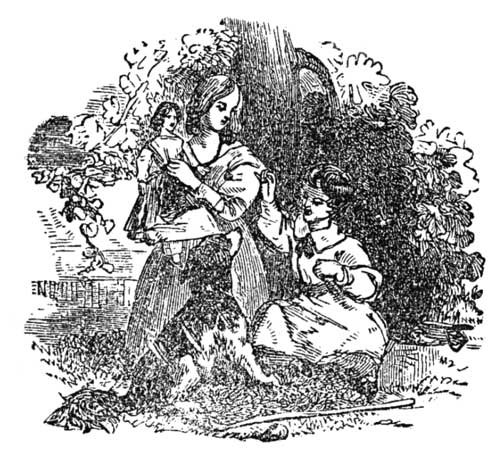
NEW YORK:
LEAVITT & ALLEN BROS.,
No. 8 HOWARD STREET.
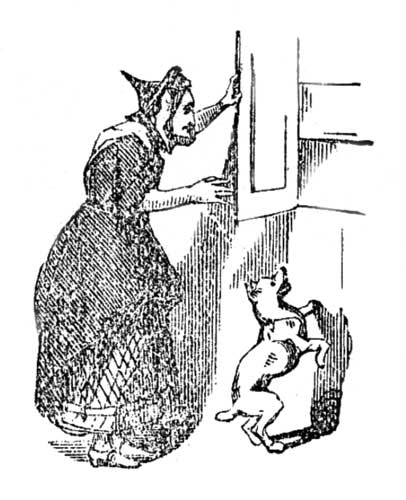
Old Mother Hubbard
Went to the cupboard,
To give her poor dog a bone;
But when she came there
The cupboard was bare.
And so the poor dog had none.
[Pg 100]

She went to the baker's
To buy him some bread,
And when she came back
Poor doggy was dead.
[Pg 101]
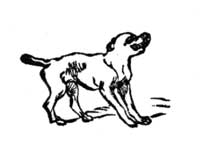
She went to the joiner's
To buy him a coffin,
And when she came back
The dog was a-laughing
[Pg 102]
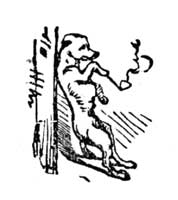
She took a clean dish
To get him some tripe.
And when she came back
He was smoking his pipe.
[Pg 103]

She went to the ale-house
To get him some beer,
And when she came back,
Doggy sat in a chair.
[Pg 104]

She went to the tavern
For white wine and red,
And when she came back
The dog stood on his head.
[Pg 105]
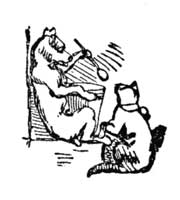
She went to the hatter's
To buy him a hat,
And when she came back
He was feeding the cat.
[Pg 106]

She went to the barber's
To buy him a wig,
And when she came back
He was dancing a jig.
[Pg 107]

She went to the fruiterer's
To buy him some fruit,
And when she came back
He was playing the flute.
[Pg 108]
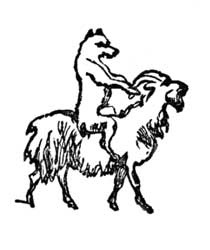
She went to the tailor's
To buy him a coat,
And when she came back
He was riding a goat.
[Pg 109]

She went to the cobbler's
To buy him some shoes,
And when she came back
He was reading the news.
[Pg 110]
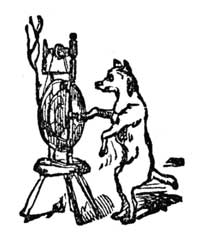
She went to the sempstress
To buy him some linen,
And when she came back
The dog was a-spinning.
[Pg 111]
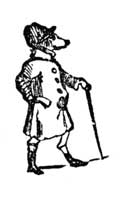
She went to the hosier's
To buy him some hose,
And when she came back
He was dressed in his clothes.
[Pg 112]

The dame made a curtsey,
The dog made a bow;
The dame said, “Your servant,”
The dog said, “Bow, wow!”
[Pg 113]

Little Bo-peep has lost her sheep,
And cannot tell where to find 'em;
Leave them alone, and they'll come home,
And bring their tails behind 'em.
Little Bo-peep fell fast asleep,
And dreamt she heard them bleating;
When she awoke, she found it a joke,
[Pg 116]For still they all were fleeting.
Then up she took her little crook,
Determined for to find them;
She found them indeed, but it made her heart bleed,
For they'd left their tails behind them.
It happened one day, as Bo-peep did stray
Unto a meadow hard by;
There she espied their tails side by side,
All hung on a tree to dry.
She heaved a sigh, and wiped her eye,
And over the hillocks she raced;
And tried what she could, as a shepherdess should,
That each tail should be properly placed.
[Pg 117]
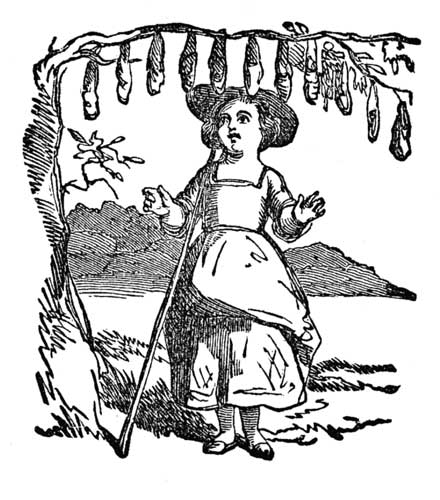
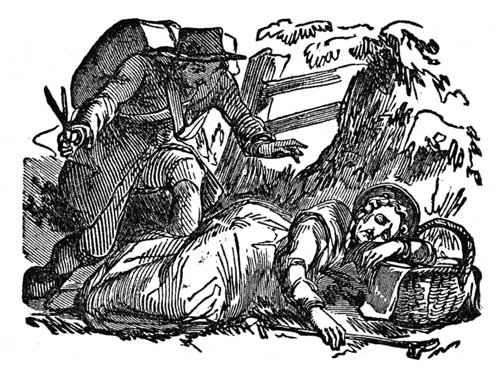
There was an old woman, as I've heard tell,
She went to the market her eggs for to sell,
She went to the market, all on a market day,
[Pg 120]And she fell asleep on the king's highway.
There came a little pedlar, his name it was Stout,
He cut off her petticoats all round about;
He cut off her petticoats up to her knees,
Until her poor knees began for to freeze.
When the little old woman began to awake,
She began to shiver, and she began to shake;
Her knees began to freeze, and she began to cry,
“Oh lawk! oh mercy on me! this surely can't be I.
“If it be not I, as I suppose it be,
I have a little dog at home, and he knows me;
If it be I, he will wag his little tail,
[Pg 121]But if it be not I, he'll bark and he'll rail.”
Up jumped the little woman, all in the dark,
Up jump'd the little dog, and he began to bark;
The dog began to bark, and she began to cry,
“O lawk! oh mercy on me! I see it is not I.”


Old Mother Goose, when
She wanted to wander,
Would ride through the air
[Pg 124]On a very fine gander.
Mother Goose had a house
'Twas built in a wood,
Where an owl at the door
For sentinel stood.
This is her son Jack,
A plain-looking lad,
He is not very good,
Nor yet very bad.
She sent him to market,
A live goose he bought;
“Here, mother,” says he,
[Pg 125]“It will not go for nought.”
Jack's goose and her gander
Grew very fond,
They'd both eat together,
Or swim in one pond.
Jack found one morning,
As I have been told,
His goose had laid him
An egg of pure gold.
Jack rode to his mother,
The news for to tell;
She call'd him a good boy,
[Pg 126]And said it was well.
Jack sold his gold egg
To a rogue of a Jew,
Who cheated him out of
The half of his due.
Then Jack went a-courting,
A lady so gay,
As fair as the lily
And sweet as the May.
The Jew and the Squire
Came close at his back,
And began to belabour
[Pg 127]The sides of poor Jack.
They threw the gold egg
In the midst of the sea;
But Jack he jump'd in,
And got it back presently.
The Jew got the goose,
Which he vow'd he would kill,
Resolving at once
His pockets to fill.
Jack's mother came in,
And caught the goose soon,
And, mounting its back,
flew up to the moon.
[Pg 129][Pg 128]
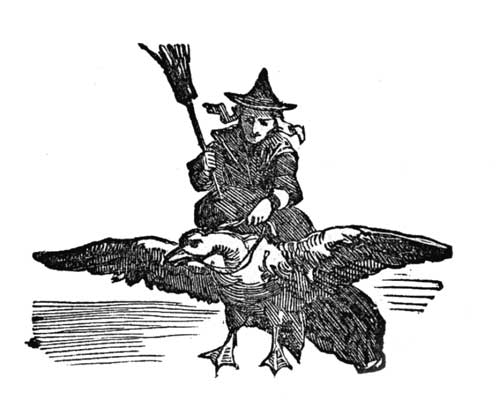
Once upon a time there were Three Bears, who lived together in a house of their own, in a wood. One of them was a Little, Small, Wee Bear; and one was a Middle-sized Bear, and the other was a Great, Huge Bear. They had each a pot for their porridge; a little pot for the Little, Small, Wee Bear; and a middle-sized pot for the Middle Bear; and a great pot for the Great, Huge Bear. And they had each a chair to sit in; a little chair for the Little, Small, Wee Bear; and a middle-sized chair for the Middle Bear; and a great chair for the Great, Huge Bear. And they had each a bed to sleep in; a little bed for the Little, Small, Wee Bear; a middle-sized bed for the Middle Bear; and a great bed for the Great, Huge Bear.

One day, after they had made the porridge for their breakfast, and poured it into their porridge-pots, they walked out into the wood while the porridge was cooling, that they might not burn their mouths by beginning too soon to eat it. And while they were walking, a little girl named Silver-hair came to the[Pg 131] house. First she looked in at the window, and then she peeped in at the keyhole; and seeing nobody in the house, she lifted the latch. The door was not fastened, because the Bears were good Bears, who did nobody any harm, and never suspected that anybody would harm them. So little Silver-hair opened the[Pg 132] door, and went in; and well pleased she was when she saw the porridge on the table. If she had been a good little girl, she would have waited till the Bears came home, and then, perhaps, they would have asked her to breakfast; for they were good Bears,—a little rough or so, as the manner of Bears is, but for all that very good-natured and hospitable.
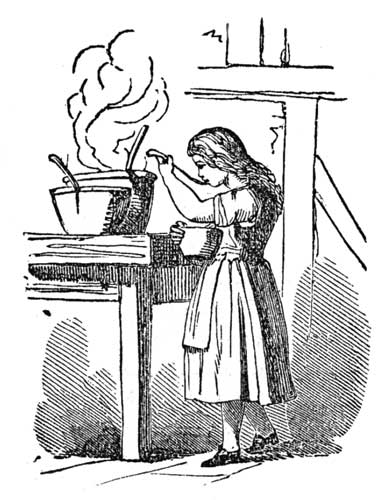
So first she tasted the porridge of the Great, Huge Bear, and that was too hot for her. And then she tasted the porridge of the Middle Bear, and that was too cold for her. And then she went to the porridge of the Little, Small, Wee Bear, and tasted that; and that was neither too hot nor too cold, but just right; and she liked it so well, that she ate it all up.
Then little Silver-hair sate down in the chair of the Great, Huge Bear, and that was too hard for her. And then she sate down in the chair of the Middle Bear, and that was too soft for her. And then she sate down in the chair of the Little, Small, Wee Bear, and that was neither too hard nor too soft, but just right. So she seated herself in it, and there she sate till the bottom of the chair came out, and down came her's, plump upon the ground.[Pg 133]
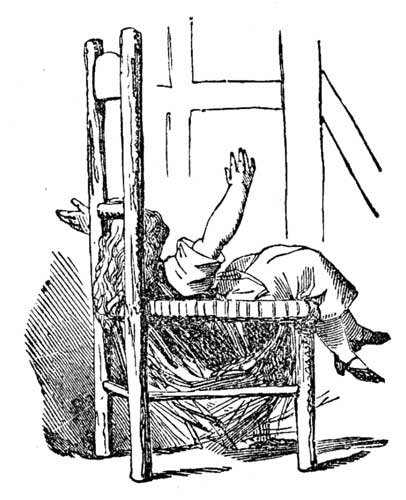
Then little Silver-hair went up stairs into the bed-chamber in which the Three Bears slept. And first she lay down upon the bed of the Great, Huge Bear; but that was too high at the head for her. And next she lay down upon the bed of the Middle Bear; and that was too high at the foot for her. And then she lay down upon the bed of the Little, Small, Wee Bear;[Pg 134] and that was neither too high at the head nor at the foot, but just right. So she covered herself up comfortably, and lay there till she fell fast asleep.
By this time the Three Bears thought their porridge would be cool enough; so they came home to breakfast. Now little Silver-hair had left the spoon of the Great, Huge Bear standing in his porridge.
“Somebody has been at my porridge!”
said the Great, Huge Bear, in his great, rough, gruff voice. And when the Middle Bear looked at his, he saw that the spoon was standing in it too.
“Somebody has been at my porridge!”
said the Middle Bear, in his middle voice.
Then the Little, Small, Wee Bear looked at his, and there was the spoon in the porridge-pot, but the porridge was all gone.
“Somebody has been at my 'porridge, and has eaten it all up!”
said the Little, Small, Wee Bear, in his little, small wee voice.
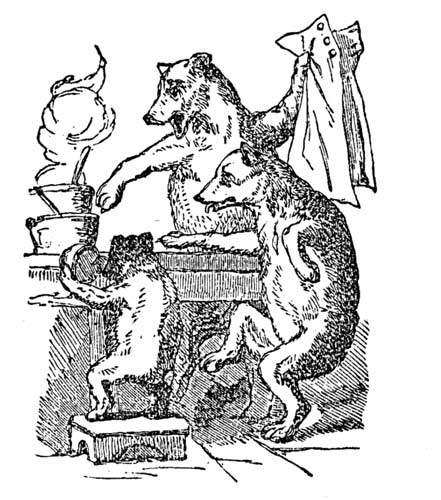
Upon this the Three Bears, seeing that some one had entered their house, and eaten up the Little, Small, Wee Bear's breakfast, began to look about them. Now little Silver-hair had not put the hard[Pg 136] cushion straight when she rose from the chair of the Great, Huge Bear.
“Somebody has been sitting in my chair!”
said the Great, Huge Bear, in his great, rough, gruff voice.
And little Silver-hair had squatted down the soft cushion of the Middle Bear.
“Somebody has been sitting in my chair!”
said the Middle Bear, in his middle voice.
And you know what little Silver-hair had done to the third chair.
“Somebody has been sitting in my chair, and has sat the bottom of it out!”
said the Little, Small, Wee Bear, in his little, small wee voice.
Then the Three Bears thought it necessary that they should make further search; so they went up[Pg 137] stairs into their bed-chamber. Now little Silver-hair had pulled the pillow of the Great, Huge Bear out of its place.
“Somebody has been lying in my bed!”
said the Great, Huge Bear, in his great, rough, gruff voice.
And little Silver-hair had pulled the bolster of the Middle Bear out of its place.
“Somebody has been lying in my bed!”
said the Middle Bear, in his middle voice.
And when the Little, Small, Wee Bear came to look at his bed, there was the bolster in its place; and the pillow in its place upon the bolster; and upon the pillow was little Silver-hair's pretty head,—which was not in its place, for she had no business there.
“Somebody has been lying in my bed,—and here she is!”
said the Little, Small, Wee Bear, in his little, small, wee voice.[Pg 138]
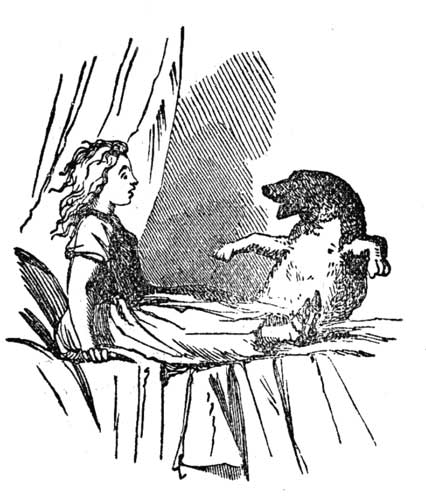
Little Silver-hair had heard in her sleep the great, rough, gruff voice of the Great, Huge Bear; but she was so fast asleep that it was no more to her than the roaring of wind, or the rumbling of thunder. And she had heard the middle voice of the Middle Bear, but it was only as if she had heard some one speak[Pg 139]ing in a dream. But when she heard the little, small, wee voice of the Little, Small, Wee Bear, it was so sharp, and so shrill, that it awakened her at once. Up she started; and when she saw the Three Bears on one side of the bed, she tumbled out at the other,[Pg 140] and ran to the window. Now the window was open, because the Bears, like good, tidy Bears, as they were, always opened their bed-chamber window when they got up in the morning. Out little Silver-hair jumped; and away she ran into the wood, and the Three Bears never saw anything more of her.
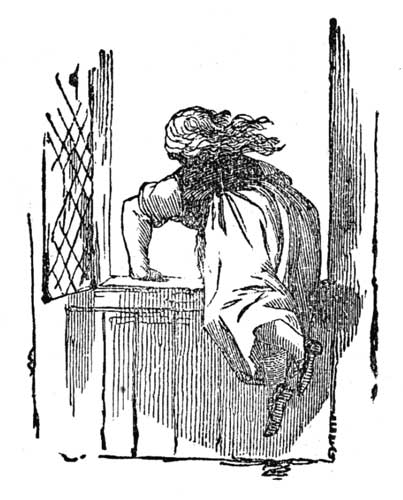

All the world must know that Goody Two-Shoes was not a little girl's real name. No; her father's name was Meanwell, and he was for many years a large farmer in the parish where Margery was born; but by the misfortunes he met with in business, and the wickedness of Sir Timothy Gripe, and a farmer named Graspall, he was quite ruined.
Care and discontent shortened the life of little Margery's father. Her poor mother survived the loss of her husband but a few days, and died of a broken heart, leaving Margery and her little brother to the wide world; but, poor woman! it would have melted your heart to have seen how frequently she raised her head while she lay speechless, to survey with pitying looks her little orphans, as much as to say: “Do, Tommy,—do, Margery, come with me.” They cried, poor things, and she sighed away her soul, and, I hope, is happy.
It would both have excited your pity and have done your heart good, to have seen how fond these two little ones were of each other, and how, hand in hand, they trotted about. They were both very ragged, and[Pg 143] Tommy had two shoes, but Margery had but one. They had nothing to support them but what they picked from the hedges, or got from the poor people, and they slept every night in a barn. Their relations took no notice of them: no, they were rich, and ashamed to own such a poor ragged girl as Margery, and such a dirty curly-pated boy as Tommy.
Mr. Smith was a very worthy clergyman, who lived in the parish where little Margery and Tommy were born; and having a relation come to see him, who was a charitable, good man, he sent for these children to him. The gentleman ordered little Margery a new pair of shoes, gave Mr. Smith some money to buy her clothes, and said he would take Tommy, and make him a little sailor; and, accordingly, had a jacket and trowsers made for him.
After some days, the gentleman intended to go to London, and take little Tommy with him. The parting between these two little children was very affecting. They both cried, and they kissed each other a hundred times. At last Tommy wiped off her tears with the end of his jacket, and bid her cry no more, for that he would come to her again when he returned from sea.[Pg 144]
Nothing could have supported little Margery under the affliction she was in for the loss of her brother but the pleasure she took in her two shoes. She ran to Mrs. Smith as soon as they were put on, and stroking down her ragged apron, cried out: “Two Shoes, Ma'am! see Two Shoes!” And so she behaved to all the people she met, and by that means obtained the name of Little Goody Two-Shoes.
Little Margery saw how good and how wise Mr. Smith was, and concluded that this was owing to his great learning; therefore she wanted of all things to learn to read. For this purpose, she used to meet the little boys and girls as they came from school, borrow their books, and sit down and read till they returned. By this means she soon got more learning than any of her playmates, and laid the following plan for instructing those who were more ignorant than herself. She found that only twenty-six letters were required to spell all the words; but as some of these letters are large, and some small, she with her knife cut out of several pieces of wood ten sets of each. And having got an old spelling-book, she made her companions set up the words they wanted to spell.
The usual manner of spelling, or carrying on the[Pg 145] game, as they called it, was this: suppose the word to be spelt was plum-pudding (and who can suppose a better?), the children were placed in a circle, and the first brought the letter p, the next l, the next u, the next m, and so on till the whole was spelt; and if any one brought a wrong letter, he was to pay a fine or play no more. This was their play; and every morning she used to go round to teach the children. I once went her rounds with her, and was highly diverted.
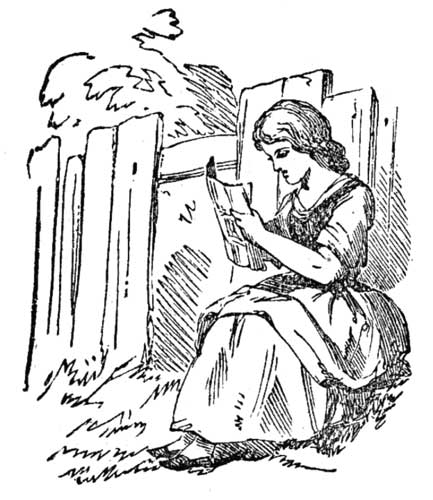
It was about seven o'clock in the morning, when we[Pg 146] set on this important business, and the first house we came to was Farmer Wilson's. Here Margery stopped, and ran up to the door,—tap, tap, tap! “Who's there?” “Only little Goody Two-Shoes,” answered Margery, “come to teach Billy.” “Oh, little Goody,” says Mrs. Wilson, with pleasure in her face. “I am glad to see you! Billy waits you sadly, for he has learned his lesson.” Then out came the little boy. “How do, Doody Two-Shoes?” says he, not able to speak plain. Yet this little boy had learned all his letters; for she threw down the small alphabet mixed together, and he picked them up, called them by their right names, and put them all in order. She then threw down the alphabet of capital letters, and he picked them all up, and having told their names, placed them rightly.
The next place we came to was Farmer Simpson's. “Bow, wow, wow!” says the dog at the door. “Sir-rah!” says his Mistress, “why do you bark at little Two-Shoes? Come in, Madge; here's Sally wants you sadly, she has learned all her lesson.” “Yes, that's what I have,” replied the little one, in the country manner; and immediately taking the letters, she set up these syllables:[Pg 147]—
ba be bi bo bu
da de di do du
ma me mi mo mu
sa se si so su
and gave them their exact sounds as she composed them; after which she set up many more, and pronounced them likewise.
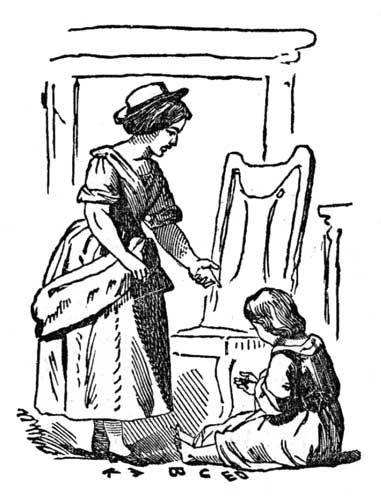
After this, little Two-Shoes taught Sally to spell words of one syllable, and she soon set up pear, plum,[Pg 148] top, ball, pin, puss, dog, hog, doe, lamb, sheep, rat, cow, bull, cock, hen, and many more.
The next place we came to was Gaffer Cook's cottage. Here a number of poor children were met to learn, and all came round little Margery at once; who, having pulled out her letters, asked the little boy next to her what he had for dinner. He answered “Bread.” “Well, then,” says she, “set up the first letter.” He put up the B, to which, the next added r, and the next e, the next a, the next d, and it stood thus, Bread.
“And what had you, Polly Comb, for your dinner?” “Apple-Pie,” answered the little girl. Upon which the next in turn set up a great A, the two next a p, each, and so on till the two words Apple and Pie were united, and stood thus, Apple-Pie. The next had potatoes, the next beef and turnips, which were spelt, with many others, till the game was finished. She then set them another task, and after the lessons were done we returned home.
Who does not know Lady Ducklington, or who does not know that she was buried in this parish? Well, I never saw so grand a funeral. All the country round came to see the burying, and it was late before[Pg 149] it was over; after which, in the night, or rather very early in the morning, the bells were heard to jingle in the steeple, which frightened the people prodigiously. They flocked to Will Dobbins, the clerk, and wanted him to go and see what it was; but William would not open the door. At length Mr. Long, the rector, hearing such an uproar in the village, went to the[Pg 150] clerk to know why he did not go into the church, and see who was there. “I go, sir!” says William; “why, I would be frightened out of my wits.” “Give me the key of the church,” says Mr. Long. Then he went to the church, all the people following him. As soon as he had opened the door, who do you think appeared? Why, little Two-Shoes, who, being weary, had fallen asleep in one of the pews during the funeral service, and was shut in all night. She immediately asked Mr. Long's pardon for the trouble she had given him, and said she should not have rung the bells, but that she was very cold, and hearing Farmer Boult's man go whistling by, she was in hopes he would have gone for the key to let her out.

The people were ashamed to ask little Madge any questions before Mr. Long, but as soon as he was gone they all got round her to satisfy their curiosity, and desired she would give them a particular account of all that she had heard or seen.
“I went to the church,” said Goody Two-Shoes, “as most of you did last night, to see the funeral, and being very weary, I sat down in Mr. Jones's pew, and fell fast asleep. At eleven o'clock I awoke; I started up, and could not at first tell where I was, but[Pg 151] after some time I recollected the funeral, and soon found that I was shut up in the church. It was dismally dark, and I could see nothing; but while I was standing in the pew something jumped upon me behind, and laid, as I thought, its hands over my shoulders. Then I walked down the church aisle, when I heard something pit pat, pit pat, pit pat, come after me, and something touched my hand that seemed as cold as a marble monument. I could not think what it was, yet I knew it could not hurt me, and therefore I made myself easy; but being very cold, and the church being paved with stones, which were very damp, I felt my way as well as I could to the pulpit, in doing which something rushed by me, and almost threw me down. At last I found out the pulpit, and having shut the door, I laid down on the mat and cushion to sleep, when something pulled the door, as I thought, for admittance, which prevented my going to sleep. At last it cried: 'Bow, wow, wow!' and I knew it must be Mr. Sanderson's dog, which had followed me from their house to the church; so I opened the door and called,' Snip! Snip!' and the dog jumped upon me immediately. After this, Snip and I lay down together, and had a comfortable nap; for when[Pg 152] I awoke it was almost light. I then walked up and down all the aisles of the church to keep myself warm; and then I went to Lord Ducklington's tomb, and I stood looking at his cold marble face and his hands clasped together, till hearing Farmer Boult's man go by, I went to the bells and rung them.”
There was in the same parish a Mrs. Williams, who kept a college for instructing little gentlemen and ladies in the science of A B C, who was at this time very old and infirm, and wanted to decline this important trust. This being told to Sir William Dove, he sent for Mrs. Williams, and desired she would examine little Two-Shoes, and see whether she was qualified for the office. This was done, and Mrs. Williams made the following report in her favour: namely, that little Margery was the best scholar, and had the best head and the best heart of any one she had examined. All the country had a great opinion of Mrs. Williams, and this character gave them also a great opinion of Mrs. Margery, for so we must now call her.
The room in which Mrs. Margery taught her scholars was very large and spacious, and as she knew that nature intended children should be always in action[Pg 153] she placed her different letters of alphabets all round the school, so that every one was obliged to get up and fetch a letter, for to spell a word, when it came to their turn; which not only kept them in health, but fixed the letters firmly in their minds.
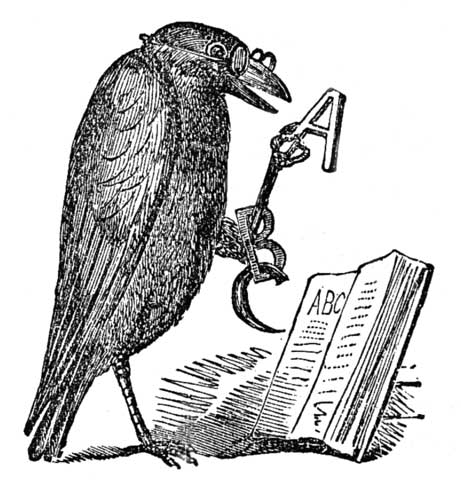
One day as Mrs. Margery was going through the next village, she met with some wicked boys who had taken a young raven, which they were going to throw at. She wanted to get the poor creature out of their cruel hands, and therefore gave them a penny for him,[Pg 154] and brought him home. She called him by the name of Ralph, and a fine bird he was.
Now this bird she taught to speak, to spell, and to read; and as he was fond of playing with the large letters, the children used to call them Ralph's Alphabet.
Some days after she had met with the raven, as she was walking in the fields, she saw some naughty boys who had taken a pigeon and tied a string to its legs, in order to let it fly and draw it back again when they pleased; and by this means they tortured the poor bird with the hopes of liberty and repeated disappointment. This pigeon she also bought, and taught him how to spell and read, though not to talk. He was a very pretty fellow, and she called him Tom. And as the raven Ralph was fond of the large letters, Tom the pigeon took care of the small ones.
The neighbours knowing that Mrs. Two-Shoes was very good, as, to be sure, nobody was better, made her a present of a little skylark. She thought the lark might be of use to her and her pupils, and tell them when it was time to get up. “For he that is fond of his bed, and lies till noon, lives but half his days, the rest being lost in sleep, which is a kind of death.”
Some time after this a poor lamb had lost its dam,[Pg 155] and the farmer being about to kill it, she bought it of him, and brought him home with her to play with the children, and teach them when to go to bed; for it was a rule with the wise men of that age (and a very good one, let me tell you) to “Rise with the lark, and lie down with the lamb.” This lamb she called Will, and a pretty fellow he was.
No sooner was Tippy, the lark, and Will, the ba-lamb, brought into the school, than that sensible rogue Ralph, the raven, composed the following verse, which every good little boy and girl should get by heart:—
“Early to bed, and early to rise,
Is the way to be healthy, wealthy, and wise.”
Soon after this, a present was made to Mrs. Margery of a little dog, whom she called Jumper. He was always in a good humour, and playing and jumping about, and therefore he was called Jumper. The place assigned for Jumper was that of keeping the door, so that he might have been called the porter of a college, for he would let nobody go out nor any one come in, without leave of his mistress.
Billy, the ba-lamb, was a cheerful fellow, and all the children were fond of him; wherefore Mrs. Two-[Pg 156]Shoes made it a rule that those who behaved best should have Will home with them at night, to carry their satchel on his back, and bring it in the morning. Mrs. Margery, as we have frequently observed, was always doing good, and thought she could never sufficiently gratify those who had done anything to serve her. These generous sentiments naturally led her to consult the interest of her neighbours; and as most of their lands were meadow, and they depended much on their hay, which had been for many years greatly damaged by the wet weather, she contrived an instrument to direct them when to mow their grass with safety, and prevent their hay being spoiled. They all came to her for advice, and by that means got in their hay without damage, while most of that in the neighbouring village was spoiled. This occasioned very great noise in the country, and so greatly provoked were the people who resided in the other parishes that they absolutely accused her of being a witch, and sent old Gaffer Goosecap, a busy fellow in other people's concerns, to find out evidence against her. The wiseacre happened to come to her school when she was walking about with the raven on one shoulder, the pigeon on the other, the lark on her[Pg 157] hand, and the lamb and the dog by her side; which indeed made a droll figure, and so surprised the man, that he cried out: “A witch! a witch! a witch!”
Upon this, she laughingly answered: “A conjuror! a conjuror!” and so they parted. But it did not end thus, for a warrant was issued out against Mrs. Margery, and she was carried to a meeting of the justices, whither all the neighbours followed her.
At the meeting, one of the justices, who knew little of life and less of the law, behaved very badly, and though nobody was able to prove anything against her, asked who she could bring to her character. “Who can you bring against my character, sir,” says she. “There are people enough who would appear in my defence, were it necessary; but I never supposed that any one here could be so weak as to believe there was any such thing as a witch. If I am a witch, this is my charm, and (laying a barometer upon the table) it is with this,” says she, “that I have taught my neighbours to know the state of the weather.”

All the company laughed; and Sir William Dove, who was on the bench, asked her accusers how they could be such fools as to think there was any such thing as a witch. And then he gave such an account[Pg 158] of Mrs. Margery and her virtue, good sense, and prudent behaviour, that the gentlemen present returned her public thanks for the great service she had done the country. One gentleman in particular, Sir Charles Jones, had conceived such a high opinion of her, that he offered her a considerable sum to take the care of his family, and the education of his daughter, which, however, she refused but this gentleman sending for[Pg 159] her afterwards, when he had a dangerous fit of illness, she went, and behaved so prudently in the family and so tenderly to him and his daughter, that he would not permit her to leave his house, but soon after made her proposals of marriage. She was truly sensible of the honour he intended her, but would not consent to be made a lady till he had provided for his daughter. All things being settled, and the day fixed, the neighbours came in crowds to see the wedding; for they were all glad that one who had been such a good little girl, and was become such a virtuous and good woman, was going to be made a lady. But just as the clergyman had opened his book, a gentleman richly dressed ran into the church, and cried: “Stop! stop!” This greatly alarmed the congregation, and particularly the intended bride and bridegroom, whom he first accosted, desiring to speak with them apart. After they had been talking a few moments, the people were greatly surprised to see Sir Charles stand motionless, and his bride cry and faint away in the stranger's arms. This seeming grief, however, was only a prelude to a flood of joy, which immediately succeeded; for you must know that this gentleman so richly dressed was little Tommy[Pg 160] Meanwell, Mrs. Margery's brother, who was just come from sea, where he had made a large fortune, and hearing, as soon as he landed, of his sister's intended wedding, had ridden post to see that a proper settlement was made on her, which he thought she was now entitled to, as he himself was able to give her an ample fortune. They soon returned to the communion-table, and were married in tears, but they were tears of joy.
Sir Charles and Lady Jones lived happily for many years. Her ladyship continued to visit the school in which she had passed so many happy days, and always gave the prizes to the best scholars with her own hands. She also gave to the parish several acres of land to be planted yearly with potatoes, for all the poor who would come and fetch them for the use of their families; but if any took them to sell, they were deprived of that privilege ever after. And these roots were planted and raised from the rent arising from a farm which she had assigned over for that purpose. In short, she was a mother to the poor, a physician to the sick, and a friend to those in distress. Her life was the greatest blessing, and her death the greatest calamity that ever was felt in the neighbourhood.[Pg 161]
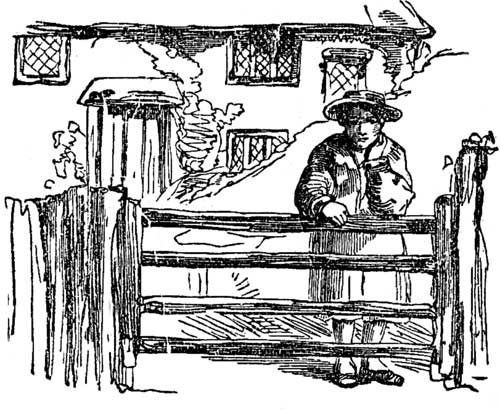 This is the house that Jack built.
This is the house that Jack built.
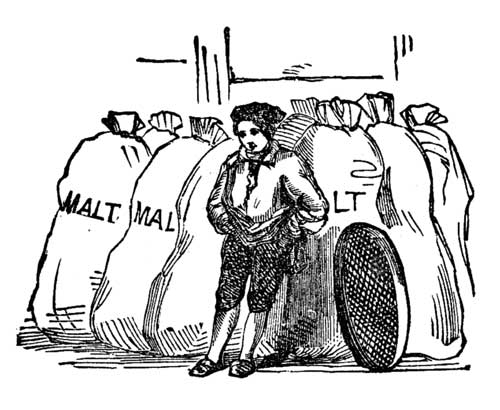
This is the malt,
That lay in the house that Jack built.
[Pg 163]

This is the rat,
That ate the malt,
That lay in the house that Jack built.
[Pg 164]

This is the cat,
That kill'd the rat,
That ate the malt,
That lay in the house that Jack built.
[Pg 165]
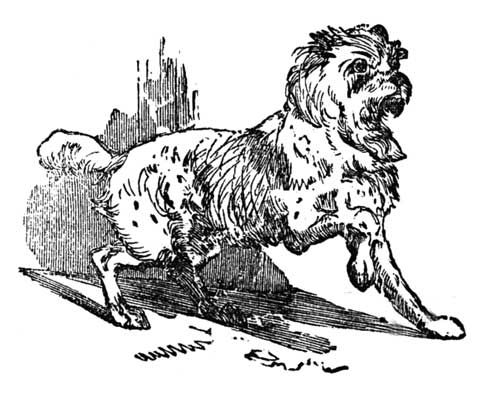
This is the dog,
That worried the cat,
That kill'd the rat,
That ate the malt,
That lay in the house that Jack built.
[Pg 166]

This is the cow with the crumpled horn,
That toss'd the dog,
That worried the cat,
That kill'd the rat,
That ate the malt,
That lay in the house that Jack built.
[Pg 167]

This is the maiden all forlorn,
That milk'd the cow with the crumpled horn,
That toss'd the dog,
That worried the cat,
That kill'd the rat,
That ate the malt,
That lay in the house that Jack built.
[Pg 168]
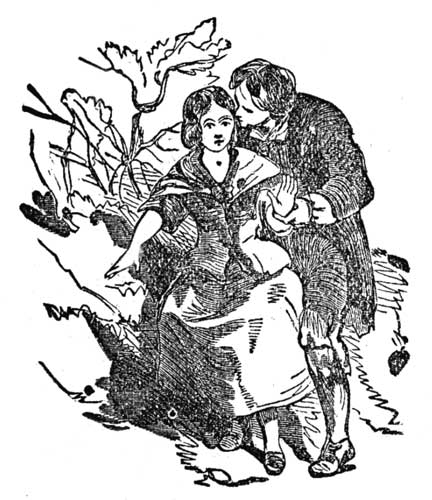
This is the man all tatter'd and torn,
That kiss'd the maiden all forlorn,
That milk'd the cow with the crumpled horn,
That toss'd the dog,
That worried the cat,
That kill'd the rat,
That ate the malt,
That lay in the house that Jack built.
[Pg 169]

This is the priest all shaven and shorn,
That married the man all tatter'd and torn,
That kiss'd the maiden all forlorn,
That milk'd the cow with the crumpled horn,
That toss'd the dog,
That worried the cat,
That kill'd the rat,
That ate the malt,
That lay in the house that Jack built.
[Pg 170]
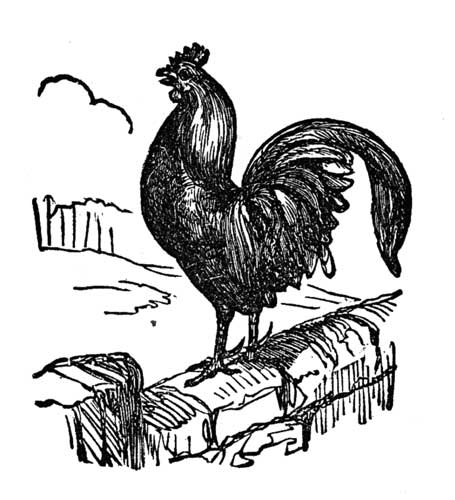
This is the cock that crow'd in the morn,
That waked the priest all shaven and shorn,
That married the man all tatter'd and torn,
That kiss'd the maiden all forlorn,
That milk'd the cow with the crumpled horn,
That toss'd the dog,
That worried the cat,
That kill'd the rat,
That ate the malt,
That lay in the house that Jack built.
[Pg 172]
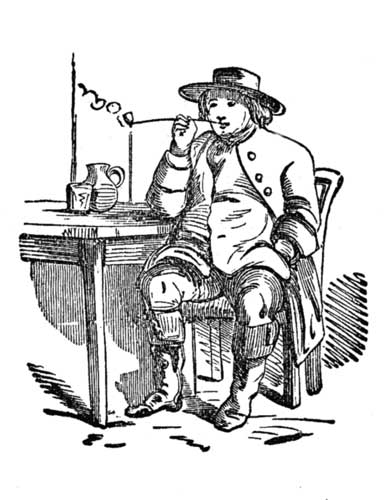
This is the farmer who sow'd the corn,
That kept the cock that crow'd in the morn,
That waked the priest all shaven and shorn,
That married the man all tatter'd and torn,
That kiss'd the maiden all forlorn,
That milk'd the cow with the crumpled horn,
That toss'd the dog,
That worried the cat,
That kill'd the rat,
That ate the malt,
That lay in the house that Jack built.
[Pg 174]

This is the horse, and the hound, and the horn,
That belong'd to the farmer who sow'd the corn,
That kept the cock that crow'd in the morn,
That waked the priest all shaven and shorn,
That married the man all tatter'd and torn,
That kiss'd the maiden all forlorn,
That milk'd the cow with the crumpled horn,
That toss'd the dog,
That worried the cat,
That kill'd the rat,
That ate the malt,
That lay in the house that Jack built.
[Pg 177][Pg 176]
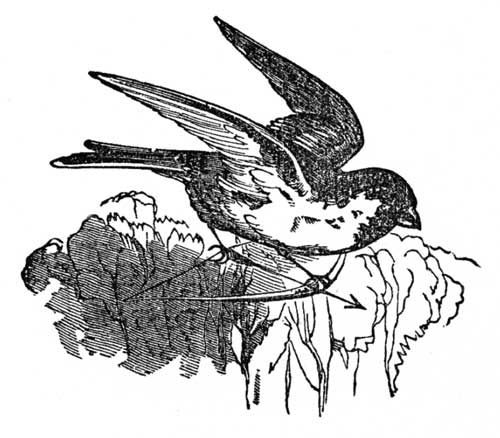
Who kill'd Cock robin?
I, said the Sparrow,
With my bow and arrow,
I kill'd Cock Robin.
[Pg 180]
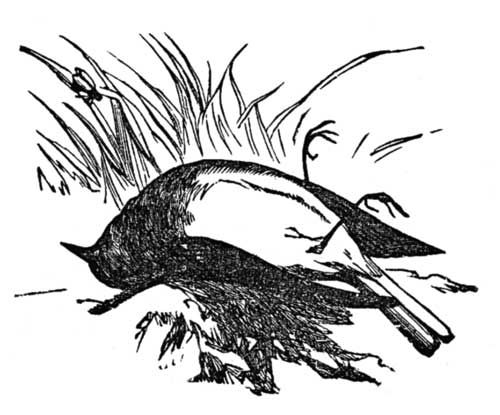
Who saw him die?
I, said the Fly,
With my little eye,
I saw him die.
[Pg 181]

Who caught his blood?
I, said the Fish,
With my little dish,
I caught his blood.
[Pg 182]
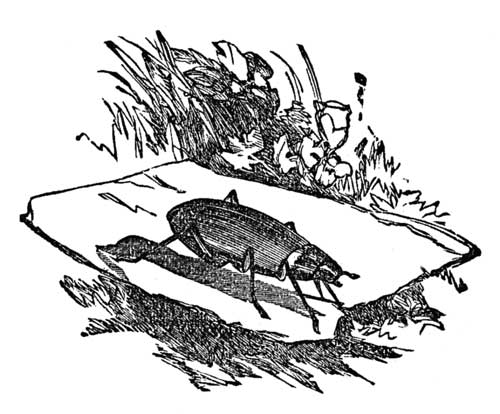
Who'll make his shroud?
I, said the Beetle,
With my little needle,
I'll make his shroud.
[Pg 183]
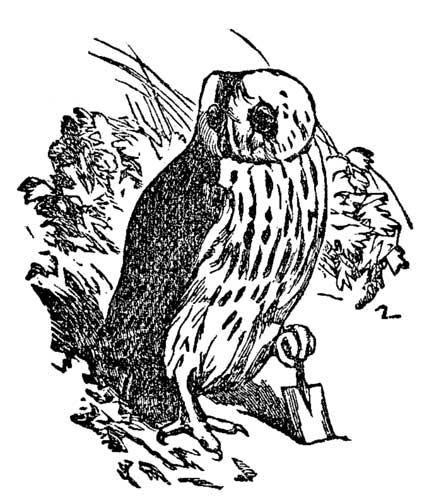
Who'll dig his grave?
I, said the Owl,
With my spade and showl,
I'll dig his grave.
[Pg 184]
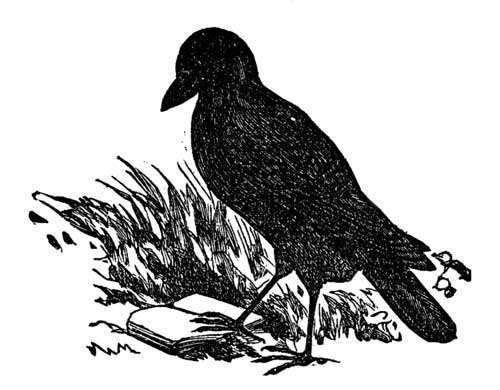
Who'll be the parson?
I, said the Rook,
With my little book,
I'll be the parson.
[Pg 185]

Who'll be the clerk?
I, said the Lark,
If it's not in the dark,
I'll be the clerk.
[Pg 186]

Who'll carry him to the grave?
I, said the Kite,
If it's not in the night,
I'll carry him to the grave.
[Pg 187]

Who'll carry the link?
I, said the Linnet,
I'll fetch it in a minute,
I'll carry the link.
[Pg 188]

Who'll be chief mourner?
I, said the Dove,
For I mourn for my love,
I'll be chief mourner.
[Pg 189]

Who'll sing a psalm?
I, said the Thrush,
As I sit in a bush,
I'll sing a psalm.
[Pg 190]

Who'll toll the bell?
I, said the Bull,
Because I can pull,
So, Cock Robin, farewell.
[Pg 191]
All the birds of the air
Fell a sighing and sobbing,
When they heard the bell toll
For poor Cock Robin.
Transcriber's note:
There was no Table of Contents in the original, one has been added in this etext.
End of the Project Gutenberg EBook of Bo-Peep Story Books, by Anonymous
*** END OF THIS PROJECT GUTENBERG EBOOK BO-PEEP STORY BOOKS ***
***** This file should be named 25461-h.htm or 25461-h.zip *****
This and all associated files of various formats will be found in:
https://www.gutenberg.org/2/5/4/6/25461/
Produced by Marilynda Fraser-Cunliffe and the Online
Distributed Proofreading Team at https://www.pgdp.net (This
file was made using scans of public domain works in the
International Children's Digital Library.)
Updated editions will replace the previous one--the old editions
will be renamed.
Creating the works from public domain print editions means that no
one owns a United States copyright in these works, so the Foundation
(and you!) can copy and distribute it in the United States without
permission and without paying copyright royalties. Special rules,
set forth in the General Terms of Use part of this license, apply to
copying and distributing Project Gutenberg-tm electronic works to
protect the PROJECT GUTENBERG-tm concept and trademark. Project
Gutenberg is a registered trademark, and may not be used if you
charge for the eBooks, unless you receive specific permission. If you
do not charge anything for copies of this eBook, complying with the
rules is very easy. You may use this eBook for nearly any purpose
such as creation of derivative works, reports, performances and
research. They may be modified and printed and given away--you may do
practically ANYTHING with public domain eBooks. Redistribution is
subject to the trademark license, especially commercial
redistribution.
*** START: FULL LICENSE ***
THE FULL PROJECT GUTENBERG LICENSE
PLEASE READ THIS BEFORE YOU DISTRIBUTE OR USE THIS WORK
To protect the Project Gutenberg-tm mission of promoting the free
distribution of electronic works, by using or distributing this work
(or any other work associated in any way with the phrase "Project
Gutenberg"), you agree to comply with all the terms of the Full Project
Gutenberg-tm License (available with this file or online at
https://gutenberg.org/license).
Section 1. General Terms of Use and Redistributing Project Gutenberg-tm
electronic works
1.A. By reading or using any part of this Project Gutenberg-tm
electronic work, you indicate that you have read, understand, agree to
and accept all the terms of this license and intellectual property
(trademark/copyright) agreement. If you do not agree to abide by all
the terms of this agreement, you must cease using and return or destroy
all copies of Project Gutenberg-tm electronic works in your possession.
If you paid a fee for obtaining a copy of or access to a Project
Gutenberg-tm electronic work and you do not agree to be bound by the
terms of this agreement, you may obtain a refund from the person or
entity to whom you paid the fee as set forth in paragraph 1.E.8.
1.B. "Project Gutenberg" is a registered trademark. It may only be
used on or associated in any way with an electronic work by people who
agree to be bound by the terms of this agreement. There are a few
things that you can do with most Project Gutenberg-tm electronic works
even without complying with the full terms of this agreement. See
paragraph 1.C below. There are a lot of things you can do with Project
Gutenberg-tm electronic works if you follow the terms of this agreement
and help preserve free future access to Project Gutenberg-tm electronic
works. See paragraph 1.E below.
1.C. The Project Gutenberg Literary Archive Foundation ("the Foundation"
or PGLAF), owns a compilation copyright in the collection of Project
Gutenberg-tm electronic works. Nearly all the individual works in the
collection are in the public domain in the United States. If an
individual work is in the public domain in the United States and you are
located in the United States, we do not claim a right to prevent you from
copying, distributing, performing, displaying or creating derivative
works based on the work as long as all references to Project Gutenberg
are removed. Of course, we hope that you will support the Project
Gutenberg-tm mission of promoting free access to electronic works by
freely sharing Project Gutenberg-tm works in compliance with the terms of
this agreement for keeping the Project Gutenberg-tm name associated with
the work. You can easily comply with the terms of this agreement by
keeping this work in the same format with its attached full Project
Gutenberg-tm License when you share it without charge with others.
1.D. The copyright laws of the place where you are located also govern
what you can do with this work. Copyright laws in most countries are in
a constant state of change. If you are outside the United States, check
the laws of your country in addition to the terms of this agreement
before downloading, copying, displaying, performing, distributing or
creating derivative works based on this work or any other Project
Gutenberg-tm work. The Foundation makes no representations concerning
the copyright status of any work in any country outside the United
States.
1.E. Unless you have removed all references to Project Gutenberg:
1.E.1. The following sentence, with active links to, or other immediate
access to, the full Project Gutenberg-tm License must appear prominently
whenever any copy of a Project Gutenberg-tm work (any work on which the
phrase "Project Gutenberg" appears, or with which the phrase "Project
Gutenberg" is associated) is accessed, displayed, performed, viewed,
copied or distributed:
This eBook is for the use of anyone anywhere at no cost and with
almost no restrictions whatsoever. You may copy it, give it away or
re-use it under the terms of the Project Gutenberg License included
with this eBook or online at www.gutenberg.org
1.E.2. If an individual Project Gutenberg-tm electronic work is derived
from the public domain (does not contain a notice indicating that it is
posted with permission of the copyright holder), the work can be copied
and distributed to anyone in the United States without paying any fees
or charges. If you are redistributing or providing access to a work
with the phrase "Project Gutenberg" associated with or appearing on the
work, you must comply either with the requirements of paragraphs 1.E.1
through 1.E.7 or obtain permission for the use of the work and the
Project Gutenberg-tm trademark as set forth in paragraphs 1.E.8 or
1.E.9.
1.E.3. If an individual Project Gutenberg-tm electronic work is posted
with the permission of the copyright holder, your use and distribution
must comply with both paragraphs 1.E.1 through 1.E.7 and any additional
terms imposed by the copyright holder. Additional terms will be linked
to the Project Gutenberg-tm License for all works posted with the
permission of the copyright holder found at the beginning of this work.
1.E.4. Do not unlink or detach or remove the full Project Gutenberg-tm
License terms from this work, or any files containing a part of this
work or any other work associated with Project Gutenberg-tm.
1.E.5. Do not copy, display, perform, distribute or redistribute this
electronic work, or any part of this electronic work, without
prominently displaying the sentence set forth in paragraph 1.E.1 with
active links or immediate access to the full terms of the Project
Gutenberg-tm License.
1.E.6. You may convert to and distribute this work in any binary,
compressed, marked up, nonproprietary or proprietary form, including any
word processing or hypertext form. However, if you provide access to or
distribute copies of a Project Gutenberg-tm work in a format other than
"Plain Vanilla ASCII" or other format used in the official version
posted on the official Project Gutenberg-tm web site (www.gutenberg.org),
you must, at no additional cost, fee or expense to the user, provide a
copy, a means of exporting a copy, or a means of obtaining a copy upon
request, of the work in its original "Plain Vanilla ASCII" or other
form. Any alternate format must include the full Project Gutenberg-tm
License as specified in paragraph 1.E.1.
1.E.7. Do not charge a fee for access to, viewing, displaying,
performing, copying or distributing any Project Gutenberg-tm works
unless you comply with paragraph 1.E.8 or 1.E.9.
1.E.8. You may charge a reasonable fee for copies of or providing
access to or distributing Project Gutenberg-tm electronic works provided
that
- You pay a royalty fee of 20% of the gross profits you derive from
the use of Project Gutenberg-tm works calculated using the method
you already use to calculate your applicable taxes. The fee is
owed to the owner of the Project Gutenberg-tm trademark, but he
has agreed to donate royalties under this paragraph to the
Project Gutenberg Literary Archive Foundation. Royalty payments
must be paid within 60 days following each date on which you
prepare (or are legally required to prepare) your periodic tax
returns. Royalty payments should be clearly marked as such and
sent to the Project Gutenberg Literary Archive Foundation at the
address specified in Section 4, "Information about donations to
the Project Gutenberg Literary Archive Foundation."
- You provide a full refund of any money paid by a user who notifies
you in writing (or by e-mail) within 30 days of receipt that s/he
does not agree to the terms of the full Project Gutenberg-tm
License. You must require such a user to return or
destroy all copies of the works possessed in a physical medium
and discontinue all use of and all access to other copies of
Project Gutenberg-tm works.
- You provide, in accordance with paragraph 1.F.3, a full refund of any
money paid for a work or a replacement copy, if a defect in the
electronic work is discovered and reported to you within 90 days
of receipt of the work.
- You comply with all other terms of this agreement for free
distribution of Project Gutenberg-tm works.
1.E.9. If you wish to charge a fee or distribute a Project Gutenberg-tm
electronic work or group of works on different terms than are set
forth in this agreement, you must obtain permission in writing from
both the Project Gutenberg Literary Archive Foundation and Michael
Hart, the owner of the Project Gutenberg-tm trademark. Contact the
Foundation as set forth in Section 3 below.
1.F.
1.F.1. Project Gutenberg volunteers and employees expend considerable
effort to identify, do copyright research on, transcribe and proofread
public domain works in creating the Project Gutenberg-tm
collection. Despite these efforts, Project Gutenberg-tm electronic
works, and the medium on which they may be stored, may contain
"Defects," such as, but not limited to, incomplete, inaccurate or
corrupt data, transcription errors, a copyright or other intellectual
property infringement, a defective or damaged disk or other medium, a
computer virus, or computer codes that damage or cannot be read by
your equipment.
1.F.2. LIMITED WARRANTY, DISCLAIMER OF DAMAGES - Except for the "Right
of Replacement or Refund" described in paragraph 1.F.3, the Project
Gutenberg Literary Archive Foundation, the owner of the Project
Gutenberg-tm trademark, and any other party distributing a Project
Gutenberg-tm electronic work under this agreement, disclaim all
liability to you for damages, costs and expenses, including legal
fees. YOU AGREE THAT YOU HAVE NO REMEDIES FOR NEGLIGENCE, STRICT
LIABILITY, BREACH OF WARRANTY OR BREACH OF CONTRACT EXCEPT THOSE
PROVIDED IN PARAGRAPH F3. YOU AGREE THAT THE FOUNDATION, THE
TRADEMARK OWNER, AND ANY DISTRIBUTOR UNDER THIS AGREEMENT WILL NOT BE
LIABLE TO YOU FOR ACTUAL, DIRECT, INDIRECT, CONSEQUENTIAL, PUNITIVE OR
INCIDENTAL DAMAGES EVEN IF YOU GIVE NOTICE OF THE POSSIBILITY OF SUCH
DAMAGE.
1.F.3. LIMITED RIGHT OF REPLACEMENT OR REFUND - If you discover a
defect in this electronic work within 90 days of receiving it, you can
receive a refund of the money (if any) you paid for it by sending a
written explanation to the person you received the work from. If you
received the work on a physical medium, you must return the medium with
your written explanation. The person or entity that provided you with
the defective work may elect to provide a replacement copy in lieu of a
refund. If you received the work electronically, the person or entity
providing it to you may choose to give you a second opportunity to
receive the work electronically in lieu of a refund. If the second copy
is also defective, you may demand a refund in writing without further
opportunities to fix the problem.
1.F.4. Except for the limited right of replacement or refund set forth
in paragraph 1.F.3, this work is provided to you 'AS-IS' WITH NO OTHER
WARRANTIES OF ANY KIND, EXPRESS OR IMPLIED, INCLUDING BUT NOT LIMITED TO
WARRANTIES OF MERCHANTIBILITY OR FITNESS FOR ANY PURPOSE.
1.F.5. Some states do not allow disclaimers of certain implied
warranties or the exclusion or limitation of certain types of damages.
If any disclaimer or limitation set forth in this agreement violates the
law of the state applicable to this agreement, the agreement shall be
interpreted to make the maximum disclaimer or limitation permitted by
the applicable state law. The invalidity or unenforceability of any
provision of this agreement shall not void the remaining provisions.
1.F.6. INDEMNITY - You agree to indemnify and hold the Foundation, the
trademark owner, any agent or employee of the Foundation, anyone
providing copies of Project Gutenberg-tm electronic works in accordance
with this agreement, and any volunteers associated with the production,
promotion and distribution of Project Gutenberg-tm electronic works,
harmless from all liability, costs and expenses, including legal fees,
that arise directly or indirectly from any of the following which you do
or cause to occur: (a) distribution of this or any Project Gutenberg-tm
work, (b) alteration, modification, or additions or deletions to any
Project Gutenberg-tm work, and (c) any Defect you cause.
Section 2. Information about the Mission of Project Gutenberg-tm
Project Gutenberg-tm is synonymous with the free distribution of
electronic works in formats readable by the widest variety of computers
including obsolete, old, middle-aged and new computers. It exists
because of the efforts of hundreds of volunteers and donations from
people in all walks of life.
Volunteers and financial support to provide volunteers with the
assistance they need, is critical to reaching Project Gutenberg-tm's
goals and ensuring that the Project Gutenberg-tm collection will
remain freely available for generations to come. In 2001, the Project
Gutenberg Literary Archive Foundation was created to provide a secure
and permanent future for Project Gutenberg-tm and future generations.
To learn more about the Project Gutenberg Literary Archive Foundation
and how your efforts and donations can help, see Sections 3 and 4
and the Foundation web page at https://www.pglaf.org.
Section 3. Information about the Project Gutenberg Literary Archive
Foundation
The Project Gutenberg Literary Archive Foundation is a non profit
501(c)(3) educational corporation organized under the laws of the
state of Mississippi and granted tax exempt status by the Internal
Revenue Service. The Foundation's EIN or federal tax identification
number is 64-6221541. Its 501(c)(3) letter is posted at
https://pglaf.org/fundraising. Contributions to the Project Gutenberg
Literary Archive Foundation are tax deductible to the full extent
permitted by U.S. federal laws and your state's laws.
The Foundation's principal office is located at 4557 Melan Dr. S.
Fairbanks, AK, 99712., but its volunteers and employees are scattered
throughout numerous locations. Its business office is located at
809 North 1500 West, Salt Lake City, UT 84116, (801) 596-1887, email
business@pglaf.org. Email contact links and up to date contact
information can be found at the Foundation's web site and official
page at https://pglaf.org
For additional contact information:
Dr. Gregory B. Newby
Chief Executive and Director
gbnewby@pglaf.org
Section 4. Information about Donations to the Project Gutenberg
Literary Archive Foundation
Project Gutenberg-tm depends upon and cannot survive without wide
spread public support and donations to carry out its mission of
increasing the number of public domain and licensed works that can be
freely distributed in machine readable form accessible by the widest
array of equipment including outdated equipment. Many small donations
($1 to $5,000) are particularly important to maintaining tax exempt
status with the IRS.
The Foundation is committed to complying with the laws regulating
charities and charitable donations in all 50 states of the United
States. Compliance requirements are not uniform and it takes a
considerable effort, much paperwork and many fees to meet and keep up
with these requirements. We do not solicit donations in locations
where we have not received written confirmation of compliance. To
SEND DONATIONS or determine the status of compliance for any
particular state visit https://pglaf.org
While we cannot and do not solicit contributions from states where we
have not met the solicitation requirements, we know of no prohibition
against accepting unsolicited donations from donors in such states who
approach us with offers to donate.
International donations are gratefully accepted, but we cannot make
any statements concerning tax treatment of donations received from
outside the United States. U.S. laws alone swamp our small staff.
Please check the Project Gutenberg Web pages for current donation
methods and addresses. Donations are accepted in a number of other
ways including including checks, online payments and credit card
donations. To donate, please visit: https://pglaf.org/donate
Section 5. General Information About Project Gutenberg-tm electronic
works.
Professor Michael S. Hart was the originator of the Project Gutenberg-tm
concept of a library of electronic works that could be freely shared
with anyone. For thirty years, he produced and distributed Project
Gutenberg-tm eBooks with only a loose network of volunteer support.
Project Gutenberg-tm eBooks are often created from several printed
editions, all of which are confirmed as Public Domain in the U.S.
unless a copyright notice is included. Thus, we do not necessarily
keep eBooks in compliance with any particular paper edition.
Most people start at our Web site which has the main PG search facility:
https://www.gutenberg.org
This Web site includes information about Project Gutenberg-tm,
including how to make donations to the Project Gutenberg Literary
Archive Foundation, how to help produce our new eBooks, and how to
subscribe to our email newsletter to hear about new eBooks.